#both of them teach the culture to Jon
Text



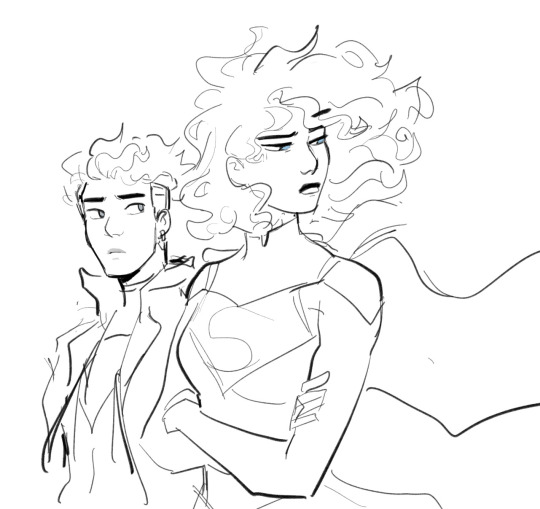



[DC Comics] guess who’s getting a movie :0000
Posting a collection of supergirl drawings from the past year to celebrate 🎉
#I have a hc that kon would be too nervous to ask Clark about kryptonian stuff in the beginning#and like also yes was iffy w Kara#but after a while they become besties and kon goes to her about krypton and stuff#and then latterrr#both of them teach the culture to Jon#clam draws#dc#dc clamics#kara zor el#supergirl#supergirl woman of tomorrow#superboy#kon el#conner kent#my art
3K notes
·
View notes
Text
TWITTER LURKERS DNI!!
Whew, It’s late as fuck and I’m tired as hell but I’m still gonna write this Jon and Damian shipping post because I’m tired of people not getting it like at all.
Firstly, I’m mentioning all of this as in before the age up because before the age up is where they had a dynamic. Right now, they are just friends who know each other.
Before the age up - Jon was established as ten in Super Sons and Damian was thirteen.
Let’s talk about that first; Jon was just created - Jon did not exist for that long since he was conceived in Thomas Wayne’s Batcave. He has barely any writing under his belt.
Their dynamic is not “Oh, Damian is the mature one who knows everything and Jon is stupid and is to be taught everything-“ No. Damian is NOT as mature as everyone makes him out to be and people only take his maturity away to make him an “Uwu adorkable cat boy-“ which is frankly annoying.
Any of these fan depictions are fine in purely fanon contexts where for fan reasons they want to mold the characters in different ways because that’s the fun of it but I’m talking entirely in a canon sense.
Anyway, Damian is someone who’s established himself as a hero, he’s come into himself and he has associates and a path he’s paving for himself. He’s supposedly to be someone that teaches Jon how to do that, he’s supposed to be someone that grows alongside Damian and with Damian and in turn Jon is supposed to be someone who teaches Damian how to be a kid.
Damian teaches Jon to be a hero - Jon teaches Damian how to be a kid.
Jon is not an idiot, he has the obvious limitations due to his age but besides that, he’s not the immature one, he’s not the sunshine one, he’s not the devoted one, he’s none of these things.
I’m so tired of these characters being watered down like this.
Jon is emotional, he’s headstrong, he’s articulate and has a level head.
If Damian is as mature as people make him out to be THEY WOULDN’T HAVE BUMPED HEADS IN THE FIRST PLACE.
Jon and Damian didn’t meet and were like oh, friends at first glance. NO, THEY HATED EACH OTHER.
More so because Jon wanted to be Damian’s friend and Damian didn’t understand how friends were supposed to work till Jon coupled with the fact that they are both kids and extremely immature.
Adventures of Super Sons

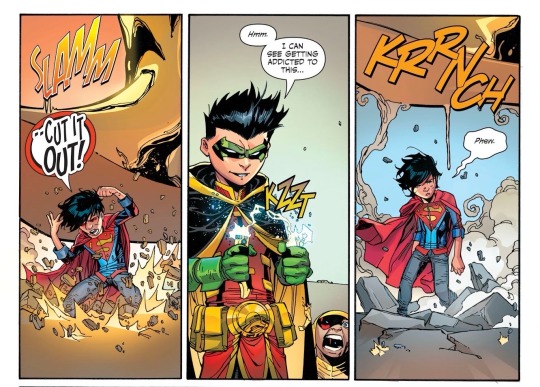
Super Sons
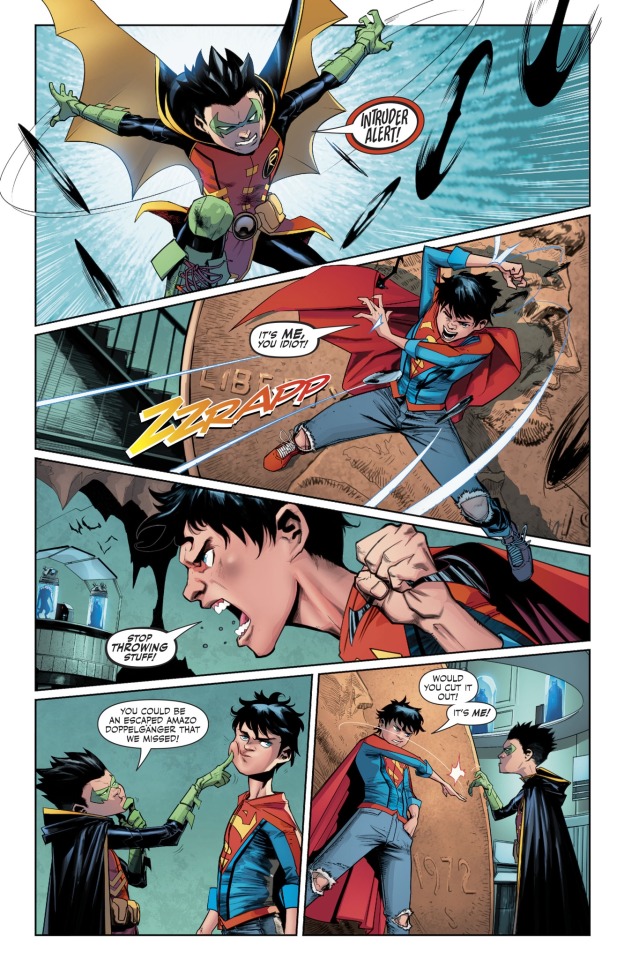
I have never in any fandom seen people put so much emphasis on an age gap before this one. I’ve seen fandoms enjoy age gaps - if you read any sort of romantic material then you’d know that an age gap will supply a certain dynamic between two characters, it can be an extra set of maturity but that isn’t really the case here.
Their age gap is just barely big enough.
Their AGE GAP IS ENTIRELY NESSACERY to their relationship with each other. It doesn’t supply much besides an opening opportunity later in the comics to make Jon feel like he needs to chase after Damian when it comes to being a hero which we will never get to see.
Jon doesn’t have friends outside of Damian besides Kathy, no because he just was established as a character.
I would also like to add that Jon doesn’t have an established birthday, I still don’t recall that he does to this day. It could be a lot smaller than we think it is and it probably is. Although, I’ve seen people call two-year age gaps weird as well which I really don’t understand because I personally have never heard that in my entire life.
Rather or not an age gap is inappropriate really differs from person to person - if you ask one person what is wrong will differ entirely from what another person thinks. It will also span from culture to culture and region to region. It’s never really been a tangible thing - I mean, ask your parents it's likely they are much more than three or four years older than the other.
Anyway, whether or not someone is being taken advantage of in a romantic relationship doesn’t hinge entirely on the age gap between them anyway but that’s another conversation.
My next point is, that no one, I mean no one should critically consider these two characters engaging in a romantic relationship while they are young - with the way that they are I sincerely doubt that they would be able to hold a romantic relationship to the other.
They would have to find each other again when they are older, and that is what literally every shipper I’ve interacted with ever has told me.


Jon and Damian may get drawn in shippy art while they are young now but it’s entirely innocent (depending on what you think is innocent again) I do indeed indulge in reblogging this art because I think it’s cute personally and harmless but it’s just art. It’s also where their relationship peaked and where Jon was actually interesting so obviously people would rather draw that instead.
Shipping these two does not inherently mean that you don’t read comics and aging up characters is not inherently problematic - which I’ve heard as well…
If I didn’t read comics then how would I know that these characters have always been aged up repeatedly through depictions?
Dceased - which they share no age gap. Here they are the same age.
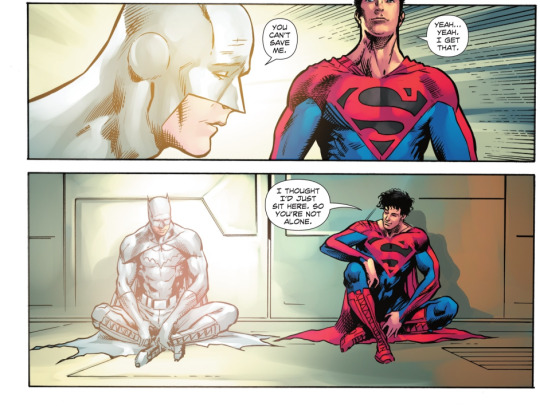
Wonder Woman - where they are in their 20s and up.


And Super Sons in the first place where they are literally in their 80s.
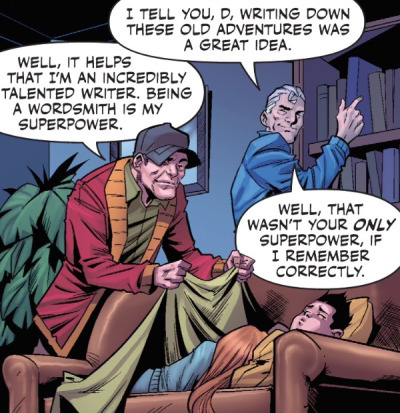
Or the movie where they’re the same age.

Mind you, Jon is sometimes written to be eleven when Damian is either thirteen or fourteen but double mind you, Damian and Jon have not known each other for a full 365 days before the age up. They are best friends but by default because neither of them has a lot of other friends.
We are not getting into how wonky ages are for Robins since Tim Drake and how writers sometimes refuse to allow characters to age…
Ugh, none of this even matters anyway because most people don’t and shouldn’t ship under the ideation that two characters should be canon anyway, I don’t personally because DC can’t even handle Damian and Jon being friends - their is no WAY they could handle a romantic relationship.
I get that we may have bad experiences with people who ship this ship like people who demonize Flatline and are idiots in general… like twitter damijon stans as well as antis are literally the most heinous people I’ve seen interact.
For example, RedeemedRobin is a psycho that doesn’t care about anyone or anything that isn’t Damijon…
But Damijon isn’t like comprised of adults who want to prey on young characters, no, I actually struggle to have a genuine conversation with someone who likes Damijon because they are mostly kids who don’t UNDERSTAND HOW THE SHIP WORKS and are super cringe which is literally the reason I’m making this post anyway. It’s so, so annoying not being able to have a genuine conversation about these characters with other shippers. I don’t know why people like to throw around ideas of how shipping spaces are WHEN THEY ARE NOT IN THOSE SPACES THEMSELVES?
Besides, comics are old and if you are an adult who enjoys damijon then it’s probably because you grew up with the characters if that’s not obvious enough I mean these comics are like almost seven years old?
Anyway, in conclusion, stop watering down these characters, stop demonizing the ship and shippers, and just stop being an idiot on the internet in general like it really shouldn’t be that hard to use your brain.
If you opened your brain half as much as you opened your mouth than we could both be much happier…
If you feel the same way as I do then please be mutuals with me, I need to free myself from this curse…
32 notes
·
View notes
Text
Full house au roommate notes pt 2
Alright, here's the second part to this post. It'll also involve a few random side notes and headcanons and whatnot
As usual, this will contain spoilers for my full house au
Ok so as I said this part is mostly about the kids. There are 7 of them split up into 3 rooms, so they had to be split 2/2/3, with one room having a bunk bed instead of a second single-person bed. They were originally planning to put all the girls together since, y'know, numbers, as well as what I said in the last part about the parents not wanting boys and girls to share rooms*
*I wanted to sort of expand on this for a moment. Personally I think it's silly- and kinda gross tbh- to suggest boys and girls can't share rooms or to assume that something would happen if they did, but it felt like a realistic thing for parents of teens to take issue with in a situation like this, considering their generally heteronormative culture. I know mine would have, lol.
Of course everyone's different about it, but those who didn't think it should matter (Joyce, Karen, Susan) didn't think it was worth arguing with those who did (Hopper, Ted, the Sinclairs). Hopper was particularly against coed rooming, since Mike was part of the equation (he's a little behind lol, mileven is not together in this au; they broke up pretty much right after the events of s4), and the Sinclairs mainly didn't want Lucas rooming with Max. Claudia didn't care either way.
As for the guardians of the "adults" (aside from Nancy & Jon, whose parents I've already talked about), they either don't care, since their kids are grown, or weren't even involved (the Harringtons are left out of the loop and don't know about any of this and I don't know if Argyle even has parents). The Buckleys are pretty chill in general and Wayne has never been one to tell his nephew what to do
However, they decided against this arrangement for Erica's sake, since she doesn't really know the other girls all that well yet, and we ended up with the actual roommate pairings, as follows
Erica, Lucas, and Dustin are roommates, since E & L are siblings, L & D are longtime friends, and E & D have more history than she has with the others (s3). I also intentionally placed these 3 on the same floor as Eddie and Steve, since those two are familiar with and important to the boys and since Steve is the "adult" Erica knows the best. (Dustin may not have an older sibling to share a floor with like Mike Will El and Erica but he does have his dads). Basically it's the Scoops Troop floor, but with Eddie & Lucas instead of Robin
That left Max and El to be roommates, which they were both thrilled about- M told E it would be like having a sleepover every night, and that they should put up a "no boys allowed" sign on their door just to piss the boys off. Protective dad Hopper enthusiastically agreed with this idea and didn't catch his daughter rolling her eyes
I also put Robin & Nancy on the same side as Max & El so they share a bathroom; seemed like that would be preferable to sharing one with the guys (not to be sexist or anything but this way the ladies don't have to deal with piss on the toilet seat or awkward questions about the "feminine hygiene products" in the cabinet. Which reminds me- did anyone ever explain to El wtf a period is??? Bc I highly doubt the Hawkins lab kids had any sort of health education and usually that's something your mom would teach you about. Idk I might address that at some point. But also- if any of the girls are having shark week problems and Robin or Nancy isn't available, they go to Eddie. I haven't decided if he's out to them but either way they know they can count on him for that sort of thing)
And then there's Mike and Will. I'm pretty sure they were always going to room together, regardless of what I had to do with organizing everyone else, because they've been practically inseparable ever since the Byers reunited with the Hawkins crew. Sharing a room is comfortable, familiar, after their years of childhood friendship. And, again, I made sure to place them on the same floor as their siblings; Nancy is diagonal to Mike, and Will is two doors down from Jon and just across the hall from El
I think that's about it for the roommate notes, the next segment might be closer looks/design details of individual rooms. Nobody asked for it but I'm having fun, so. Yeah >:3
#full house au#stranger things fanfic#here have some notes#current wip#stranger things#roommates#stranger things headcanons
7 notes
·
View notes
Text
youtube
Author issues stark warning over cancel culture - ‘We’ll be studying it in 100 years!’
John Cleese: I'm so grateful that you came. Greg Lukianoff has co-written the best book on this subject that I've read. You co-wrote it with Jonathan Haidt, wonderful author. It's called "The Coddling of the American Mind," and it's the most interesting thing I've read on all this stuff.
But what I'm fascinated by, is that it all started with you having a severe depression. So, tell the tale.
Greg Lukianoff: Well, in 2007 I got so depressed I had to be hospitalized as a danger to myself. And in the process of recovering the next year, I studied Cognitive Behavioral Therapy. And Cognitive Behavioral Therapy is something that teaches you to talk back to your own exaggerated thoughts.
Cleese: So, when you have the voices in your head you argue with them?
Lukianoff: Exactly. When you're catastrophizing, you call it out…
Cleese: So catastrophizing means what?
Lukianoff: That you're just thinking everything's going to be a catastrophe. It sounds very much like it sounds. When people are anxious and depressed, they have all of these cognitive distortions you know at Volume 11 going on in their head. And that just getting in the habit of talking back to them can relieve many of the symptoms of anxiety and depression.
Cleese: So, when you discovered that, what happened then?
Lukianoff: Well, you know, it changed my life, but I started seeing all over the place ways in which we were teaching young people the habits of anxious and depressed people. It was as if, both in K through 12, in grade school and in higher education, it was like the adults were saying, by the way do catastrophize, do engage in emotional reasoning, do engage in binary thinking, which I know you think a lot about as well.
Cleese: So, you linked up with Jon?
Lukianoff: I linked up with Jon Haidt, I told him what I thought was -- cause I'm a constitutional lawyer. My major focus…
Cleese: Are you? I thought I liked you.
Lukianoff: … and I was defending freedom of speech on college campuses, and academic freedom, and I noticed around 2013 that students were really clamping down, both on freedom of speech, but they were also rationalizing it in this kind of medicalized way that was all catastrophizing, all binary thinking, all of these cognitive distortions. So, we wrote an article together in 2015, saying the things that are threatening free speech on campus are also the kind of mental habits that will make young people anxious and depressed.
Essentially, it's teaching people that essentially, they should avoid challenges, they should avoid things that cause them any pain, but of course and things that cause you pain are also what cause you growth. And so, the emphasis on having your children not experience either physical or emotional pain or challenges, is actually a profoundly unhealthy way to teach kids to think about the world, and to let them be kids and grow up. It's tempting as a parent, because I have a five and a seven-year-old, I understand that you want to protect your kids from emotional difficulty, but if you don't prepare them for a world that's difficult, and you don't prare them for challenges, you're not preparing them to be adults. And even worse. you're creating a situation where of course they're going to be anxious and depressed, because they're afraid of the world, they're afraid of adulthood.
Cleese: Having all these insights with you, how do they affect the people who are advocating woke ideas?
Lukianoff: I think that to a degree, this terrible advice is inherent to a lot of what we might call woke ideology. That essentially, challenge is bad, that you should always follow your emotions, and most importantly, that life is a battle between good people and evil people. A lot of the ideology that we're seeing particularly on campuses, is this very simple narrative of there is pure good and pure evil, and you want to be on the side of pure good always at war with the other.
Cleese: So that if you agree with a lot of the transgender agenda but disagree with some of it, then you are a very bad…
Lukianoff: You're absolutely evil.
Cleese: … person and you're absolutely wrong.
Lukianoff: Yeah, and this is part of the way that unfortunately, in the places where we should be learning to argue like adults, we're teaching this very childish way of arguing. It creates the situation where you can just dismiss any person, any book, any thinker, any institution you disagree with, because since you can find everything is evil, anytime you don't want to listen to somebody, you just declare them evil and…
Cleese: You don't have to bother with them.
Lukianoff: You don't have to challenge your thinking at all.
Cleese: Now, I want to ask you a little bit more about cancel culture, because every time I get on television, the second question is something to do with cancel culture, and my friends are saying, why are you always talking about cancel culture. And the answer is, we're obsessed with it. Tell me what you're thinking about it.
Lukianoff: So, I have a book coming out called "Cancelling of the American Mind."
Cleese: Cancelling, yes.
Lukianoff: Yes, and it's making the point that not only is cancel culture real, but it's so bad we're going to be studying it in 100 years. One thing that we've collected is the number of professors who have been punished or fired. And in the United States, you have to go back to the 1950s to McCarthyism to see numbers that are anywhere near as close to the number of professors…
Cleese: What? The McCarthyism?
Lukianoff: In terms of numbers, absolutely. The estimate's about about 100 to 150 professors were fired from 1947 to 1957. And right now, we're approaching 200 professors getting fired.
Cleese: How does it happen? The students?
Lukianoff: Used to be the administrators were the ones getting professors in trouble. And then it increasingly became the students and the fellow professors who were reporting them. So, McCarthyism, it was generally people outside of higher education who were reporting professors. But now it's coming from within, and it's devastating for the production of knowledge. Because if people think -- people aren't stupid. If they look at an expert, and they come up with an opinion, and they say to themselves, "wait a second, if you can be cancelled for having the wrong opinion, why should I trust you to be objective about this anyway?"
Cleese: Is it anything to do with the fact that the fees at universities now are so high that the students are also kind of customers as well as students?
Lukianoff: That is part of the problem.
Cleese: And they don't want to lose their customers, right?
Lukianoff: It's related to the fees both because it creates a "customer is always right" situation, but also because those fees, at least in the states, increasingly pay for armies and armies, ever growing numbers of bureaucrats and administrators who enforce really rigid ideological norms. They police freedom of speech and it creates an environment that is very chilled.
Cleese: Because the only real aim they have in life is not to get fired.
Lukianoff: Careerism definitely plays a part, but there's also people who think that the key to saving the world is less and less freedom of speech. You would think we would have learned a bit from Galileo.
#John Cleese#The Dinosaur Hour#Greg Lukianoff#The Coddling of the American Mind#Cancelling of the American Mind#cancel culture#academic corruption#cognitive distortions#cognitive behavioral therapy#woke ideology
7 notes
·
View notes
Text
Bold the facts - Fiona
[ PERSONAL ]
$ Financial: wealthy / moderate / poor / in poverty (She knows what it’s like to be poor though. He family’s property was almost completely lost in the 1745 uprising and she lived as her aunt’s and uncle’s ward for many years.)
✚ Medical: fit / moderate / sickly / disabled / disadvantaged / non applicable
✪ Class or Caste: upper / middle / working / unsure / other
✔ Education: qualified / unqualified / studying / other (She graduated from a girls’ school and continued to teach there for a while. She also teaches the village girls.)
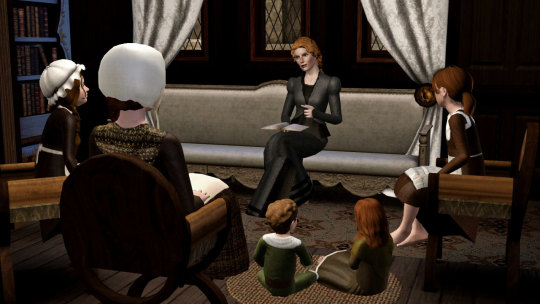
✖ Criminal Record: yes, for major crimes / yes, for minor crimes / no / has committed crimes, but not caught yet / yes, but charges were dismissed
[ FAMILY ]
◒ Children: had a child or children / has no children / wants children
◑ Relationship with Family: close with sibling(s) / not close with sibling(s) / has no siblings / sibling(s) is deceased (She didn’t spend much time with her brothers. As a girls she was brought up in a different sphere, but they were always nice to her when they met. She still feels loyalty and affection for them, even though they had to go to exile in Canada. Since she enabled them to make a fresh start, they’ve been writing to each other at least once a year.)
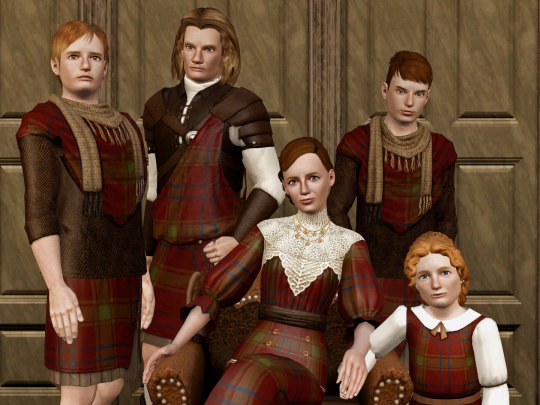
◔ Affiliation: orphaned / adopted / disowned / raised by birth parent(s) / not applicable (Orphaned at the age of 13)
[ TRAITS + TENDENCIES ]
♦ extroverted / introverted / in between
♦ disorganized / organized / in between
♦ close minded / open-minded / in between (She wasn’t prejudiced against Fergus’ and later Ysobel’s proposals and neither against Matt when he arrived.)
♦ calm / anxious / in between
♦ disagreeable / agreeable / in between
♦ cautious / reckless / in between
♦ patient / impatient / in between
♦ outspoken / reserved / in between (She’s not afraid to speak her mind, but she also has a strong sense of privacy.)
♦ leader / follower / in between (Ysobel would like to feel protective of her, but rarely gets an opportunity)
♦ empathetic / vicious bastard / in between
♦ optimistic / pessimistic / in between
♦ traditional / modern / in between (She’s known for doing unconventional things, and people don’t even know everything.)
♦ hard-working / lazy / in between
♦ cultured / uncultured / in between / unknown (As stated above, she’s a teacher by profession and she learned a lot more through Matt and Jon.)
♦ loyal / disloyal / unknown
♦ faithful / unfaithful / unknown (Everyone would describe her as faithful, but sometimes she wonders if it’s right to be with her husband’s sister. That’s why she doesn’t allow herself romantic feelings for Ysobel.)
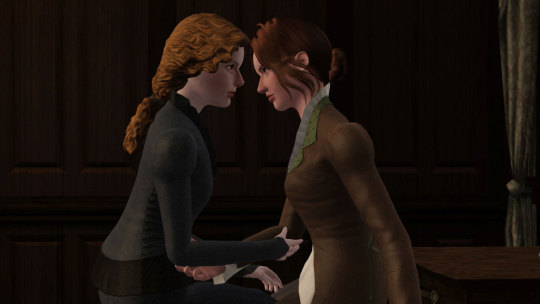
[ BELIEFS ]
★ Faith: monotheist / polytheist / atheist / agnostic (Somewhat surprisingly for her political background she’s from a Protestant family.)
☆ Belief in Ghosts or Spirits: yes / no / don’t know / don’t care
✮ Belief in an Afterlife: yes / no / don’t know / don’t care
✯ Belief in Reincarnation: yes / no / don’t know / don’t care
❃ Belief in Aliens: yes / no / don’t know / don’t care
✧ Religious: orthodox / liberal / in between / not religious (Same as Ysobel in this category: Going to church in daytime, haunted by Fergus at night.)

❀ Philosophical: yes / no (Not trying to grasp the meaning of the meaning, but very good at saying the right thing to someone who needs to hear it. This comes from her girls’ school background.)
[ SEXUALITY & ROMANTIC INCLINATION ]
❤ Sexuality: heterosexual / homosexual / bisexual / asexual / pansexual (Though she wouldn’t like to hear that.)
❥ Sex: sex repulsed / sex neutral / sex favorable / naive and clueless
♥ Romance: romance repulsed / romance neutral / romance favorable /naive and clueless / romance suspicious
❣ Sexually: adventurous / experienced / naive / inexperienced / curious (Weirdly enough, in both her relationships she was obliged to take the lead at first. With Fergus due to his being completely overwhelmed with the situation, with Ysobel because she was the one who’d had sex before. Entirely not how she was told married life would work.)
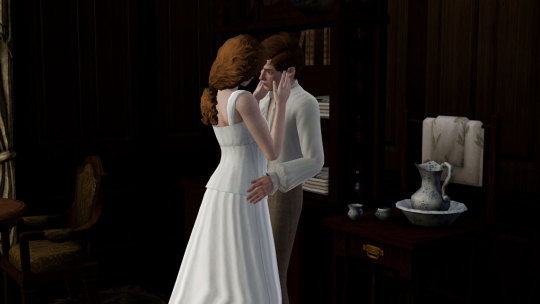
⚧ Potential Sexual Partners: male / female / agender / other / none / all
⚧ Potential Romantic Partners: male / female / agender / other / none / all
[ ABILITIES ]
☠ Combat Skills: excellent / good / moderate / poor / none
≡ Literacy Skills: excellent / good / moderate / poor / none
✍ Artistic Skills: excellent / good / moderate / poor / none
✂ Technical Skills: excellent / good / moderate / poor / none
[ HABITS ]
☕ Drinking Alcohol: never / special occasions / sometimes / frequently / Alcoholic
☁ Smoking: tried it / trying to quit / quit / never / rarely / sometimes / frequently / Chain-smoker
✿ Recreational Drugs: never / special occasions / sometimes / frequently / addict
✌ Medicinal Drugs: never / no longer needs medication / some medication needed / frequently / to excess (Like Ysobel: Sometimes curing minor complaints with home-remedies)
☻ Unhealthy Food: never / special occasions / sometimes / frequently / binge eater
$ Splurge Spending: never / sometimes / frequently / shopaholic
♣ Gambling: never / rarely / sometimes / frequently / compulsive gambler
(Every time I get to the drug part I wish someone would start a historical bold-the-facts.)
13 notes
·
View notes
Photo



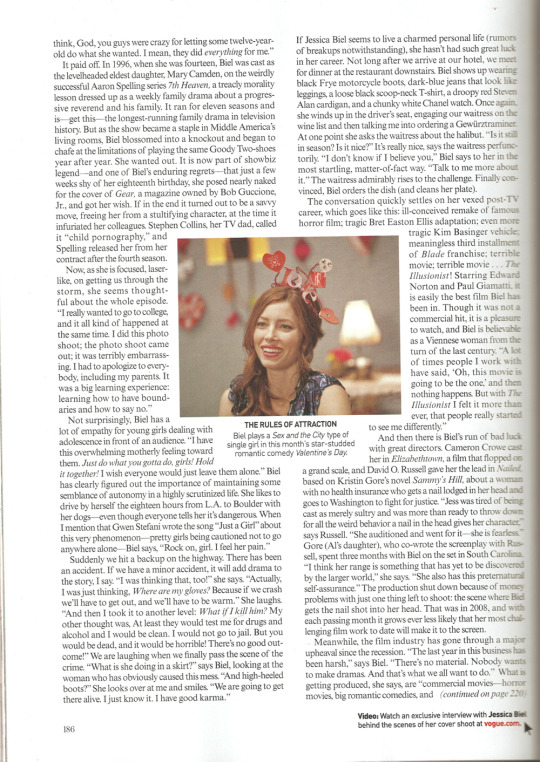
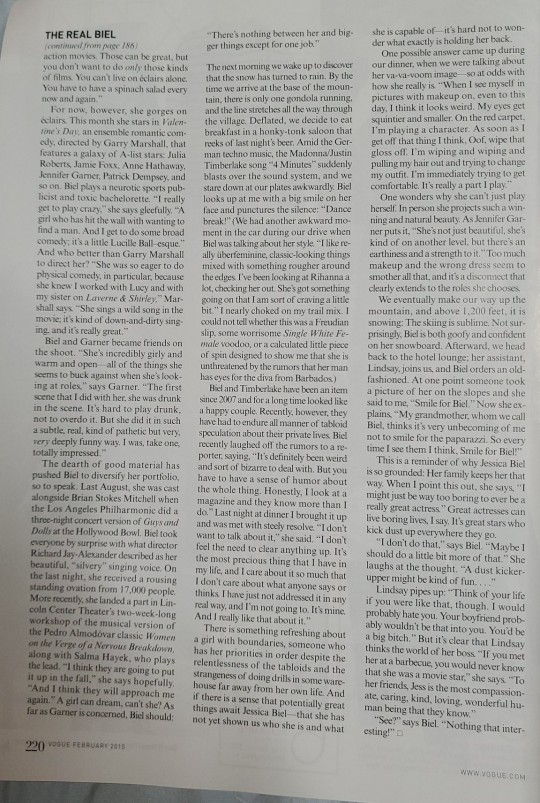

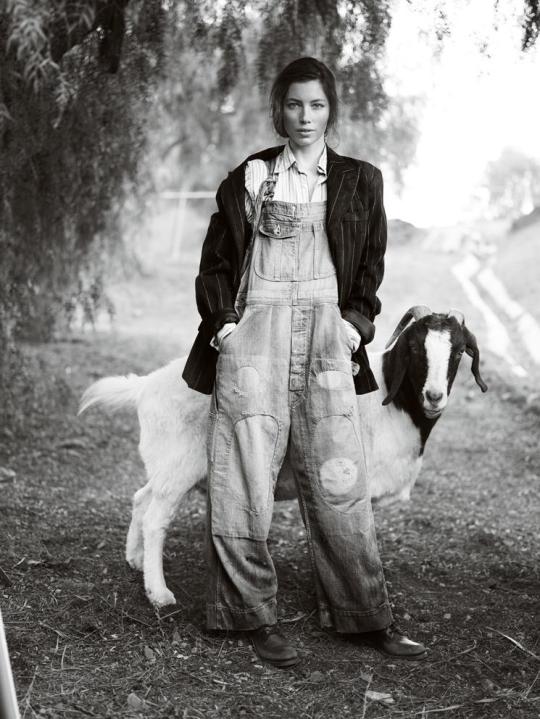

Jessica Biel for Vogue, February 2010
The Real Biel
You can learn all sorts of interesting things about a person on a road trip together. For example: Jessica Biel is a very good driver. She is behind the wheel of a Subaru heading north from Vancouver toward Whistler, one of the ski resorts hosting the Olympics this month. Because of record-breaking snow, Biel has decided to ditch the more traditional plans she’d made for our interview and hit the slopes instead. So here we are, side by side, snacking on trail mix and listening to the sound track to Where the Wild Things Are. In the car in front of us is Biel’s assistant and best friend, Lindsay Ratowsky, who is being driven with all of our bags and equipment. Our mini caravan left Vancouver in the late afternoon in a downpour, and now we are driving in the dark in a snowstorm. Wearing jeans and hiking boots, Biel, who grew up in Boulder, Colorado, and has been snowboarding since she was a kid, is utterly in her element. “This is very much a me moment: in the snow, in the Subaru, listening to music,” she says. “I feel really at peace in this environment.”
It’s a far cry from where we were two hours ago, when Biel had 40 pounds of ammo strapped around her waist and an M4 semiautomatic assault rifle hoisted above her right shoulder. We were on the outskirts of Vancouver in an empty warehouse the size of a Walmart, part of the soundstage where she has been filming The A-Team. Paul, a dashing fellow with a British accent whom Biel describes as the “resident badass,” was teaching her the finer points of racking and reloading. After Biel squeezed off several deafening rounds, Paul calculated the number of mistakes she made and then said, “Twenty-four!” She dropped to the floor and gave him two dozen push-ups. It was only then that I noticed that she is as thin as a teenage boy and all muscle. Her usual Jessica Rabbit curves have all but disappeared, the red-carpet Sex Bomb nowhere to be found.
Who is Jessica Biel? Let’s admit it: She is a bit of a cipher. The girls who read the tabloids think of her as Justin Timberlake’s on-again, off-again girlfriend; my aunt Nancy thinks of her as little Mary Camden from the mid-nineties WB series 7th Heaven; and most men under 40 think of her as the smokin’ hottie who let Adam Sandler massage her breasts in I Now Pronounce You Chuck & Larry. I think it is fair to say that Jessica Biel has not yet experienced a unifying cultural moment. In other words: She can still ride the subway, which, in fact, she tells me she just did the other day. “I talked to a girl who liked my shoes,” she says. “ ‘Oh, those are cute. Where’d you get those?’ ‘I got them at Barneys.’ ‘Are you from New York?’ ‘No, I’m from out of town.’ ‘Oh, cool. Nice to talk to you.’ ‘Nice to talk to you!’ ”
My own expectations were equally off-base; I imagined her as a sort of modern-day Raquel Welch. I thought she would purr. But that notion was shattered the instant I met her. It does not take long to figure out that Jessica Biel is a mellow creature, a young woman who appears to be completely at ease with herself and who meets the world on her own terms. I spent nearly two full days with her, and not once did I see her tense up. This is at least partly due to how she was raised. She describes her parents as hippies. “They are major outdoor people,” she says. “They rafted the Grand Canyon when they were in their 20s. They are an incredible couple.”
Her father, Jon, worked for GE for many years and ran his own business consultancy in Boulder. “He is extremely motivated and ambitious,” she says. “I get those qualities from him.” Her mother, Kim, grew up one of six kids in a small town a few hours southwest of Denver where Jessica and her parents both own cabins on adjoining properties. Her mother’s side of the family is part Native American: Those crazy-high cheekbones are shared by her younger brother, mother, and grandmother. When she tells me that her parents dehydrate their own food, culture their own vegetables, and make their own coconut kefir, I can’t help laughing. “I actually do, too!” she says.
One of the benefits of having hippie parents is that they tend to indulge whimsy. Handbell choir! Jazz and tap class! By the time Biel was in her early teens, she was training as a level-six gymnast and starring in local musicals. One summer she took a commercial-acting class. It led to a talent convention in Los Angeles, which landed her an agent and a scholarship to a kids’ acting school. “I was hooked,” she says. It was around this time that her parents started making sacrifices so she could be in L.A. for pilot season. “It was stressful, for sure: my mom leaving my brother when he was so little for months at a time; my dad having to deal on his own. Sometimes I look back and think, God, you guys were crazy for letting some twelve-year-old do what she wanted. I mean, they did everything for me.”
It paid off. In 1996, when she was fourteen, Biel was cast as the levelheaded eldest daughter, Mary Camden, on the weirdly successful Aaron Spelling series 7th Heaven, a treacly morality lesson dressed up as a weekly family drama about a progressive reverend and his family. It ran for eleven seasons and is—get this—the longest-running family drama in television history. But as the show became a staple in Middle America’s living rooms, Biel blossomed into a knockout and began to chafe at the limitations of playing the same Goody Two-shoes year after year. She wanted out. It is now part of showbiz legend—and one of Biel’s enduring regrets—that just a few weeks shy of her eighteenth birthday, she posed nearly naked for the cover of Gear, a magazine owned by Bob Guccione, Jr., and got her wish. If in the end it turned out to be a savvy move, freeing her from a stultifying character, at the time it infuriated her colleagues. Stephen Collins, her TV dad, called it “child pornography,” and Spelling released her from her contract after the fourth season.
Now, as she is focused, laser-like, on getting us through the storm, she seems thoughtful about the whole episode. “I really wanted to go to college, and it all kind of happened at the same time. I did this photo shoot; the photo shoot came out; it was terribly embarrassing. I had to apologize to everybody, including my parents. It was a big learning experience: learning how to have boundaries and how to say no.”
Not surprisingly, Biel has a lot of empathy for young girls dealing with adolescence in front of an audience. “I have this overwhelming motherly feeling toward them. Just do what you gotta do, girls! Hold it together! I wish everyone would just leave them alone.” Biel has clearly figured out the importance of maintaining some semblance of autonomy in a highly scrutinized life. She likes to drive by herself the eighteen hours from L.A. to Boulder with her dogs—even though everyone tells her it’s dangerous. When I mention that Gwen Stefani wrote the song “Just a Girl” about this very phenomenon—pretty girls being cautioned not to go anywhere alone—Biel says, “Rock on, girl. I feel her pain.”
Suddenly we hit a backup on the highway. There has been an accident. If we have a minor accident, it will add drama to the story, I say. “I was thinking that, too!” she says. “Actually, I was just thinking, Where are my gloves? Because if we crash we’ll have to get out, and we’ll have to be warm.” She laughs. “And then I took it to another level: What if I kill him? My other thought was, At least they would test me for drugs and alcohol and I would be clean. I would not go to jail. But you would be dead, and it would be horrible! There’s no good outcome!” We are laughing when we finally pass the scene of the crime. “What is she doing in a skirt?” says Biel, looking at the woman who has obviously caused this mess. “And high-heeled boots?” She looks over at me and smiles. “We are going to get there alive. I just know it. I have good karma.”
If Jessica Biel seems to live a charmed personal life (rumors of breakups notwithstanding), she hasn’t had such great luck in her career. Not long after we arrive at our hotel, we meet for dinner at the restaurant downstairs. Biel shows up wearing black Frye motorcycle boots, dark-blue jeans that look like leggings, a loose black scoop-neck T-shirt, a droopy red Steven Alan cardigan, and a chunky white Chanel watch. Once again, she winds up in the driver’s seat, engaging our waitress on the wine list and then talking me into ordering a Gewürztraminer. At one point she asks the waitress about the halibut. “Is it still in season? Is it nice?” It’s really nice, says the waitress perfunctorily. “I don’t know if I believe you,” Biel says to her in the most startling, matter-of-fact way. “Talk to me more about it.” The waitress admirably rises to the challenge. Finally convinced, Biel orders the dish (and cleans her plate).
The conversation quickly settles on her vexed post-TV career, which goes like this: ill-conceived remake of famous horror film; tragic Bret Easton Ellis adaptation; even more tragic Kim Basinger vehicle; meaningless third installment of Blade franchise; terrible movie; terrible movie . . . The Illusionist! Starring Edward Norton and Paul Giamatti, it is easily the best film Biel has been in. Though it was not a commercial hit, it is a pleasure to watch, and Biel is believable as a Viennese woman from the turn of the last century. “A lot of times people I work with have said, ‘Oh, this movie is going to be the one,’ and then nothing happens. But with The Illusionist I felt it more than ever, that people really started to see me differently.”
And then there is Biel’s run of bad luck with great directors. Cameron Crowe cast her in Elizabethtown, a film that flopped on a grand scale, and David O. Russell gave her the lead in Nailed, based on Kristin Gore’s novel Sammy’s Hill, about a woman with no health insurance who gets a nail lodged in her head and goes to Washington to fight for justice. “Jess was tired of being cast as merely sultry and was more than ready to throw down for all the weird behavior a nail in the head gives her character,” says Russell. “She auditioned and went for it—she is fearless.” Gore (Al’s daughter), who co-wrote the screenplay with Russell, spent three months with Biel on the set in South Carolina. “I think her range is something that has yet to be discovered by the larger world,” she says. “She also has this preternatural self-assurance.” The production shut down because of money problems with just one thing left to shoot: the scene where Biel gets the nail shot into her head. That was in 2008, and with each passing month it grows ever less likely that her most challenging film work to date will make it to the screen.
Meanwhile, the film industry has gone through a major upheaval since the recession. “The last year in this business has been harsh,” says Biel. “There’s no material. Nobody wants to make dramas. And that’s what we all want to do.” What is getting produced, she says, are “commercial movies—horror movies, big romantic comedies, and action movies. Those can be great, but you don’t want to do only those kinds of films. You can’t live on éclairs alone. You have to have a spinach salad every now and again.”
For now, however, she gorges on éclairs. This month she stars in Valentine’s Day, an ensemble romantic comedy, directed by Garry Marshall, that features a galaxy of A-list stars: Julia Roberts, Jamie Foxx, Anne Hathaway, Jennifer Garner, Patrick Dempsey, and so on. Biel plays a neurotic sports publicist and toxic bachelorette. “I really get to play crazy,” she says gleefully. “A girl who has hit the wall with wanting to find a man. And I get to do some broad comedy; it’s a little Lucille Ball-esque.” And who better than Garry Marshall to direct her? “She was so eager to do physical comedy, in particular, because she knew I worked with Lucy and with my sister on Laverne & Shirley,” Marshall says. “She sings a wild song in the movie; it’s kind of down-and-dirty singing, and it’s really great.”
Biel and Garner became friends on the shoot. “She’s incredibly girly and warm and open—all of the things she seems to buck against when she’s looking at roles,” says Garner. “The first scene that I did with her, she was drunk in the scene. It’s hard to play drunk, not to overdo it. But she did it in such a subtle, real, kind of pathetic but very, very deeply funny way. I was, take one, totally impressed.”
The dearth of good material has pushed Biel to diversify her portfolio, so to speak. Last August, she was cast alongside Brian Stokes Mitchell when the Los Angeles Philharmonic did a three-night concert version of Guys and Dolls at the Hollywood Bowl. Biel took everyone by surprise with what director Richard Jay-Alexander described as her beautiful, “silvery” singing voice. On the last night, she received a rousing standing ovation from 17,000 people. More recently, she landed a part in Lincoln Center Theater’s two-week-long workshop of the musical version of the Pedro Almodóvar classic Women on the Verge of a Nervous Breakdown, along with Salma Hayek, who plays the lead. “I think they are going to put it up in the fall,” she says hopefully. “And I think they will approach me again.” A girl can dream, can’t she? As far as Garner is concerned, Biel should: “There’s nothing between her and bigger things except for one job.”
The next morning we wake up to discover that the snow has turned to rain. By the time we arrive at the base of the mountain, there is only one gondola running, and the line stretches all the way through the village. Deflated, we decide to eat breakfast in a honky-tonk saloon that reeks of last night’s beer. Amid the German techno music, the Madonna/Justin Timberlake song “4 Minutes” suddenly blasts over the sound system, and we stare down at our plates awkwardly. Biel looks up at me with a big smile on her face and punctures the silence: “Dance break!” (We had another awkward moment in the car during our drive when Biel was talking about her style. “I like really überfeminine, classic-looking things mixed with something rougher around the edges. I’ve been looking at Rihanna a lot, checking her out. She’s got something going on that I am sort of craving a little bit.” I nearly choked on my trail mix. I could not tell whether this was a Freudian slip, some worrisome Single White Female voodoo, or a calculated little piece of spin designed to show me that she is unthreatened by the rumors that her man has eyes for the diva from Barbados.)
Biel and Timberlake have been an item since 2007 and for a long time looked like a happy couple. Recently, however, they have had to endure all manner of tabloid speculation about their private lives. Biel recently laughed off the rumors to a reporter, saying, “It’s definitely been weird and sort of bizarre to deal with. But you have to have a sense of humor about the whole thing. Honestly, I look at a magazine and they know more than I do.” Last night at dinner I brought it up and was met with steely resolve. “I don’t want to talk about it,” she said. “I don’t feel the need to clear anything up. It’s the most precious thing that I have in my life, and I care about it so much that I don’t care about what anyone says or thinks. I have just not addressed it in any real way, and I’m not going to. It’s mine. And I really like that about it.”
There is something refreshing about a girl with boundaries, someone who has her priorities in order despite the relentlessness of the tabloids and the strangeness of doing drills in some warehouse far away from her own life. And if there is a sense that potentially great things await Jessica Biel—that she has not yet shown us who she is and what she is capable of—it’s hard not to wonder what exactly is holding her back.
One possible answer came up during our dinner, when we were talking about her va-va-voom image—so at odds with how she really is. “When I see myself in pictures with makeup on, even to this day, I think it looks weird. My eyes get squintier and smaller. On the red carpet, I’m playing a character. As soon as I get off that thing I think, Oof, wipe that gloss off. I’m wiping and wiping and pulling my hair out and trying to change my outfit. I’m immediately trying to get comfortable. It’s really a part I play.”
One wonders why she can’t just play herself. In person she projects such a winning and natural beauty. As Jennifer Garner puts it, “She’s not just beautiful, she’s kind of on another level, but there’s an earthiness and a strength to it.” Too much makeup and the wrong dress seem to smother all that, and it’s a disconnect that clearly extends to the roles she chooses.
We eventually make our way up the mountain, and above 1,200 feet, it is snowing: The skiing is sublime. Not surprisingly, Biel is both goofy and confident on her snowboard. Afterward, we head back to the hotel lounge; her assistant, Lindsay, joins us, and Biel orders an old-fashioned. At one point someone took a picture of her on the slopes and she said to me, “Smile for Biel.” Now she explains: “My grandmother, whom we call Biel, thinks it’s very unbecoming of me not to smile for the paparazzi. So every time I see them I think, Smile for Biel!”
This is a reminder of why Jessica Biel is so grounded: Her family keeps her that way. When I point this out, she says, “I might just be way too boring to ever be a really great actress.” Great actresses can live boring lives, I say. It’s great stars who kick dust up everywhere they go.
“I don’t do that,” says Biel. “Maybe I should do a little bit more of that.” She laughs at the thought. “A dust kicker-upper might be kind of fun. . . .”
Lindsay pipes up: “Think of your life if you were like that, though. I would probably hate you. Your boyfriend probably wouldn’t be that into you. You’d be a big bitch.” But it’s clear that Lindsay thinks the world of her boss. “If you met her at a barbecue, you would never know that she was a movie star,” she says. “To her friends, Jess is the most compassionate, caring, kind, loving, wonderful human being that they know.”
“See?” says Biel. “Nothing that interesting!”
27 notes
·
View notes
Note
So… what do you think was in the dornish letter sent to Aegon?
Can I address this in a somewhat circuitous way? Haha.
Well, the thing about Martin's writing is that when you look at how rumors are treated in ASOIAF, which allows multiple primary viewpoints that allow us to weigh the accuracy of rumors other characters hear about those they've never met but we know, you realize there's a pattern. The rumors are somehow often rooted in truth, yet very rarely actually accurate in how they are told to others. We might hear three or four variations of the same rumor, and the common thread is true, but the spins on it say more about biases and culture than fact.
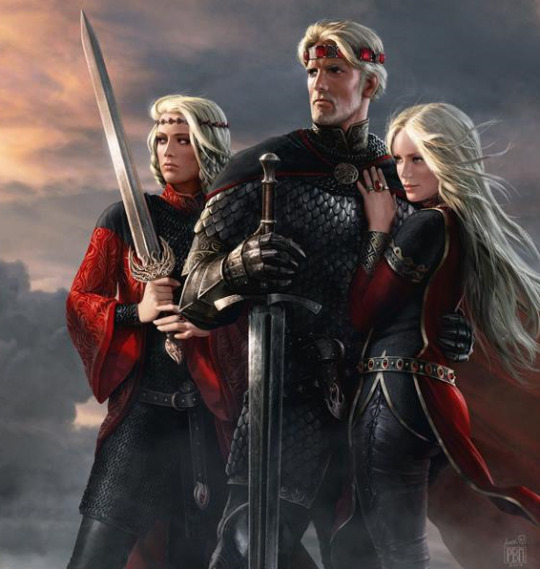
In Fire & Blood, because it's a history, we can see that some of the rumors are probably based in truth (otherwise why would Martin include them?) but probably not always accurate, much like in the main series. At the same time, we don't have other viewpoints from reliable witnesses as it happens, so that adds uncertainty that isn't there in ASOIAF. Thus, we have to weigh the rumors bases on other details, like character traits all sources seem to agree on, etc.
The show House of the Dragon actually did a good job of this in how they melded the rumors of Rhaenyra losing her virginity to Daemon and Criston (which clearly can't both be true), and Criston's grudge against Rhaenyra and rumored subsequent proposal together. The truth can more or less be found by piecing together aspects of each rumor.
Other rumors I think can be determined: Mushroom's relaying of Mysaria and the brothel queens of Helaena and Alicent. It is absolutely within Mysaria's character to suggest this, so I do believe she suggested this. I do not believe Rhaenyra allowed it to actually happen, hence the very firm denial that this ever happened by Gyldalyn. Plus, Mushroom never says this actually happened, just relays the suggestion, so the logical conclusion is it did not. But the fact that it's present at all surely indicates it didn't come just from Mushroom's twisted mind.
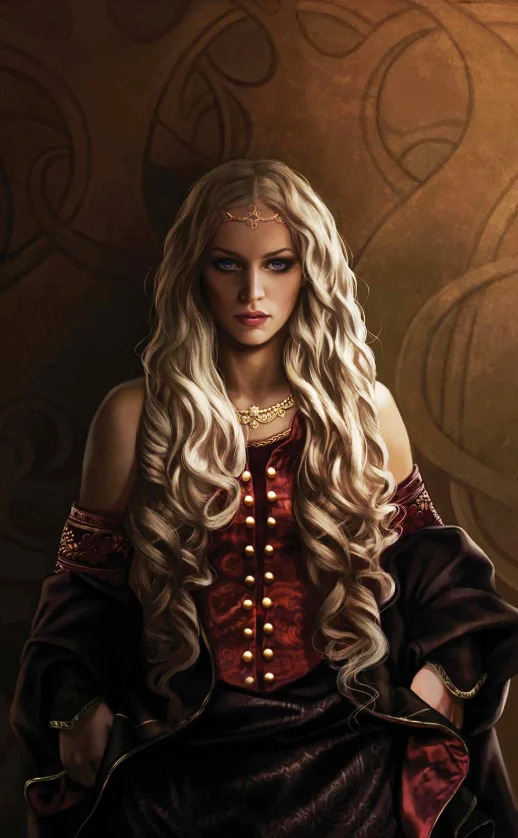
Sara Snow: enough with people suggesting she didn't exist. She's mentioned in the book alongside a Pact of Ice and Fire (a clear callback to the actual series' title), and is a clear allusion to both Lyanna and Jon Snow. She existed. Martin would not have written her in there if she did not. A bastard disappearing from history is hardly unheard of, either. What happened between her and Jace isn't clear, of course, but we do know that it is notably odd that both sources point to Jace declining to marry Baela when she was eager to, and the Jace and Aemond parallels become stronger when you compare Alys/Aemond and Sara/Jace. Thus, it seems very likely something happened, whether it was romantic feelings, her simply teaching Jace to pray to the old gods, or the marriage discussed.
So, let's look at the rumors about the letter and about Rhaenys. What we know for sure:
Meraxes was shot down from the sky in 10 AC.
Rhaenys' body was never returned to King's Landing.
Princess Deria of Dorne brought Meraxes' skull and a letter to Aegon in 13 AC.
Aegon immediately flew to Dragonstone after reading the letter, and then agreed to terms of peace.
Rumors:
Rhaenys fell to her death.
Rhaenys was crushed under Meraxes.
Rhaenys was found alive and slowly tortured to death by the Ullers.
Common sense conclusions:
The letter said something about Rhaenys' death.
The fact that Aegon, who loved her, immediately wanted to be alone after reading it and never spoke about its contents means that it had great value to him.
It would be exceedingly unlikely for Rhaenys to survive such a fall, but not impossible.
Now let's look at the rumors. Two of them indicate she died in the fall; one does not. Conclusion: Rhaenys was probably horrifically injured in the fall, perhaps fatally. Surviving such a fall is possible; surviving uninjured? Seems highly unlikely.

The existence of the letter indicates that someone had something to say about her death that was meaningful and did not provoke Aegon to want to immediately raze Dorne in revenge, so we can conclude it was not mocking her death, and probably indicates that Rhaenys lived for a bit after her fall.
My personal conclusion, thus, is that Rhaenys was horrifically injured in the fall and cared for our of human decency and compassion. The letter conveys this to Aegon, while also somehow proving to him that the contents are true (probably by including a piece of information only Rhaenys would have known).
There's one more thing. Aegon flying off to Dragonstone is interesting, as is the note that Rhaenys' body was never brought back to King's Landing. That's clever wording there. Dragonstone is, of course, where the Targaryens would cremate their dead. That Aegon immediately headed to Dragonstone after receiving Meraxes' skull strongly indicates that the Martells sent either Rhaenys' bones or her ashes to Dragonstone (not King's Landing), and Aegon went there to either cremate her and scatter, or just scatter, her ashes.
I was also recently shown a reddit theory that is similar, except it suggests the Ullers nursed her back to health and then tortured her; the Martells then rescued her but could not save her. This is also very possible, but I think the simpler explanation is the fall being the main cause of her death; plus, Martin records her death in 10 AC. But that's hair-splitting, imo; the main gist of the letter is likely we tried, she died, she said this as her last words, here's her body, remember we're people too just like we remembered she was.
#rhaenys targaryen#aegon the conqueror#asoiaf#fire & blood meta#fire & blood#a song of ice and fire#asoiaf theory#jacaerys velaryon#sara snow#letter from dorne
29 notes
·
View notes
Note
tell me about valsethera and those angels and jon 👀<
The specifics of Jon deValjio's extended family drama (which we CAN get into) will have to wait until we get back into roll20. Simply know that he's from a Pathfinder 2e campaign, in which four characters from four very different settings are brought into a world that appears to be grafted out of pieces of countless other worlds. All of them are great.
Jon deValjio is a human cleric from a desert continent that used to be a single massive kingdom, and has since fallen into chaos and been consumed by political infighting. He is a follower of Soralyon, a deity of architecture and ruins, and he basically wanders around trying to uncover pieces of lost history in the naive belief that people are all arguing because nobody knows what the truth is! Their history is being lost! So, naturally, if he can just find all the answers, he can tell everyone and everything will be okay again! No more endless conflict consuming the country or leading to heated political arguments over dinner! Right?
And of course Soralyon would never steer him wrong! That's why every time he gets a weird urge to do something or something unexplainable happens, he is more than happy to go along with it! Because they're in this together! Sure, he kind of got sent to the top of a tower and saw that he'd been somehow transported away from everything he's ever known, but that has to be happening for a reason, doesn't it? Of course it does! He's meeting people from so many new cultures! He is learning so much! And can he be honest? It's kind of nice to get away from all the... you know, all the arguing and everything? Everything with his family and his brother – not that he wants to get away from his brother, of course! His brother's great! Have you heard about his brother? He's a real hero! Like, a real one! Jon never really had the stomach for that. Never was the most popular. But this is great! He's like, a research hero now! He bets that he'll go back home when the time is right. You know, once he's learned the thing he's supposed to learn, and he can go back and teach everybody! Maybe it'll be the answer to everything! No one has ever had an opportunity like this before! It'll turn out okay in the end!
Notably, Jon is from a culture that has almost no non-humans. It does, however, have aggressive feral dragons that raid small towns and eat livestock, and sometimes people. This has led to some tension and confusion between the tiefling bard (who he assumed was some sort of dragon person??) and the party monk, whose monastery worships dragons (eastern dragons, generally benevolent). He gets along great with the party android investigator, because they are both awkward nerds who are determined to figure out all the secrets. We were expecting some juicy drama to come out of the whole situation. Two sessions in, everyone somehow ended up being legitimate fast friends. It even felt earned. He and the tiefling bard even bonded over their worlds being full of weird hierarchies and political bullshit! The monk taught the bard how to meditate! It was great!
Jon rules. He takes notes about like, everything. Very friendly. Kinda clueless. A little self-righteous. A lot naive and head in the clouds. He also has a sickass religious tattoo that makes his entire right arm look like it's made out of banded agate from the elbow down.
As for Valsethera and those funny angels... say, what do you think happens when beings of pure law try to help run a city of humans?
This piece of comedy gold happens. Please behold.
(Featuring the amoral lesbians Des and Aanei, one of whom fed her master to the other, and then who agreed to an ill-advised bargain for power out of a covetous urge to take control of her own life, and a deep and hungry curiosity. The sea demon was also fueled by the covetous urge to see a mortal gorge herself on power and desire and to see what havoc she would wreak if she accompanied her. Deep and hungry curiosity all around.)
#thank you rad for asking us about our funny little ocs. please retrieve your prize#our ocs#rad#writing#angels#asks
3 notes
·
View notes
Note
So Stannis suggested Jon to become Lord of WF and take Val his wife. Jon at one point even consider it but rejected the idea. Even Sam thought that Val can make peace between Wildlings and North. But what I don't understand how can a Wildling be a Lady of WF? Especially when she knew nothing about running the castle. Why characters in books are over hyping her?
Hi anon!
Val's princess status is a fictitious construct, and most characters absolutely know this. It only matters because the person who is interested in upholding that construct is the guy with all the armed knights who blasted the wildling host to smithereens and captured many of them, and now holds considerable sway at the Wall: King Stannis.
I don't believe that Sam ever genuinely thought that Val had the ability to serve her intended purpose.
Sam reddened. King Stannis had plans for Val, he knew; she was the mortar with which he meant to seal the peace between the northmen and the free folk. "I don't have time for archery today, I need to go see Jon." (AFFC; Samwell I)
Sam is iterating Stannis' plan, not his own agreement.
The only characters in the books who are hyping Val as a "princess" with real political value are the people of Stannis' court who are deeply uninterested in actually understanding the way wildling culture functions. Their "Southern" understanding of kingship and claims to rulership makes Val a supposed princess. Marrying the highest royalty available to them to the future Lord of Winterfell is the kind of politics they are used to. They’ll pretend it into existence. They’ll “kindly” teach Val how she’s supposed to act as a princess, to make the fiction stick. That's it.
Some wildlings actually take advantage of that willful pretense, like Gerrick Redbeard "descended from the line of Raymund Redbeard" (or his little brother), making him a "rightful king of the wildlings" and his daughters "princesses", which Selyse is very accepting of. It certainly gets them a cushier reception than the other wildlings. Everyone else thinks its nonsense, but it's a fragile fiction on which social advancement can rest in this new reality they all find themselves in.
Jon only briefly considers the option of marrying Val for the opportunity it presents to fulfill his own secret dream of being Lord of Winterfell. He creates an unrealistic fantasy that absolutely disregards Val as a person, and he rejects the entire idea long before he would have had to consider the issue seriously on its political merits. For most of ADWD, Jon tries to caution Stannis and Selyse when it comes to their expectations of Val.
Much later he himself begins to project certain qualities onto her, culminating in the utter height of blurry vision:
She may not be a princess, but she would make a worthy wife for any lord. (...) They are all convinced she is a princess. Val looked the part and rode as if she had been born on horseback. A warrior princess, he decided, not some willowy creature who sits up in a tower, brushing her hair and waiting for some knight to rescue her. "I must inform the queen of this agreement," he said. "You are welcome to come meet her, if you can find it in yourself to bend a knee." It would never do to offend Her Grace before he even opened his mouth.(ADWD, Jon XI)
Only to have that fantasy shattered, and for Val to thoroughly offend the queen and follow up with the desire to kill her daughter, citing her wildling identity as the reason for both. She is not going to just disappear into a fictional title, she is a woman of the free folk, with her own values and customs and a stern lack of desire to change any of them for the benfit of an oppressor.
So, Jon briefly fell into that hilarious trapdoor of Val being a “princess” and forgot how different their worlds truly are, only to be dunked into an icy water trough of reality right on the heels of it.
No, GRRM is saying, this would never work as easily as Stannis is pretending. Not individually for Val, and not generally for the wildlings as a whole. She is neither a princess in person, nor is she one politically. She will not keep any man’s castle and bear his children to be raised as Northmen. Nor would wildlings ride into battle in her name or inversely keep the peace for her, based on whose relative she is. She is not a beacon under which to unite the North and the wildlings. It’s nonsense.
And everyone knows it.
100 notes
·
View notes
Note
4, 8, 21 for Sister Jon oc ask game. I actually know the answer to 21 and this is me putting u on blast slash u gotta brag about your feat minmaxing
(i am i literally saving 4 for another ask because you have COMPELLED me to write an ESSAY about LANGUAGES)

8. Describe their body type
Sister Jon:
Tall!!!!! beefy!!!!!!!!!! (6')
but specifically: broad shoulders, flat chested, strong thighs. Honestly, just googling “female swimmer’s build” will cover it. She is beefy because she is also a barbarian and needs to be strong enough to lovingly carry her husband, carefully manhandle her patients, and aggressively sprint with sword and shield.
Faustin:
Taller!!!!!! spindly!!!!!!! (6'3")
He is a dainty dandy with broad shoulders, and that’s just about it.
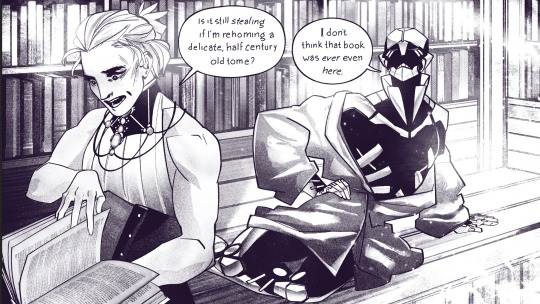
21. How many languages do they speak, and what are they?
…between the both of them…………….ALL OF THEM…………….. almost..........
Sister Jon: (In the order she learned them in)
Common/Elvish, Dwarven, Sylvan, Abyssal, Celestial, and Tabaxi. (Forged — she can understand it, but she cannot speak it)
The verbal components of her spells reflect the language she learned them in, and in the case of Celestial or Abyssal, the nature of the creature shes trying to appeal to or defend against.
She also creates needlessly complex ciphers for her personal notes and spells simply because its fun.
Faustin: (also in the order he learned them in)
Common/Warforged/Dwarven, Undercommon, Infernal, Abyssal, Elvish, and Primordial
AND THEN THERES A WHOLE ESSAY UNDER THE READMORE TOO since uh..... well theres a lot of character details and world flavor that you can put into language selection ok
Sister Jon
Elvish is the primary language of Luminere, the city she was born and raised in. So as a child, she was raised learning and speaking both Common and Elvish interchangeably.
Dwarven is a language she learned very early on, with her biggest motivation being research. Dwarven is the primary language in the north, and she prefers being able to read texts in the original language of the author, rather than having to go through a translation. With this academic focus, her usage of dwarven was largely formal. It wasn’t until she got in contact with Faustin that her verbiage become more and more relaxed, and specifically regionalized to Bachburg (Faustin’s hometown).
Sylvan is an ancient language that is all but dead. A lot of ancient and spiritual texts are written in Sylvan, so while its not uncommon for academics and scholars to have a shared connection in it, the Abbey of the Sacred Wall is one of the very few institutes that teaches Sylvan to full fluency. Despite being based in the center of Luminere, the Abbey has omitted Elvish from its spoken repertoire entirely and instead prioritizes Common and Sylvan.
Abyssal and Celestial she learned later in her academic career; the study of these languages being largely theoretical. They are not spoken by any cultures and peoples, outside of the individual aasimar, or someone with direct contact to outer planar beings. Its not unheard of for those dabbling in spiritualism to pick up a rough attempt at pronouncing key phrases in either language — such as basic words of warning or invitation before a seance — but to be able to speak either of them more accurately than the equivalent of an inter-generational game of telephone, is incredibly rare (and even then, often left to academic style and interpretation)
Given that her approach to exorcism is steeped heavily in separating the invading mind from that of the host, being able to speak and understand the languages spoken of the outer planes is vital. This is why she has studied the two languages so widely and so thoroughly.
Tabaxi she initially learned as a trade language, but became a language she studied for pure fun. She has a love of digging through niche shops for obscure books and rare components, and the best shops with the best products are often connected to the Cat-o-Lug trade circles. Tabaxi, being a trade language, is also heavily influenced by other languages — and seeing these other spoken languages converge in a single language like Tabaxi is endlessly fascinating to her.
Forged is a language that she can understand, but cannot speak. The language of the Warforged is protected and secretive. Its a language that they made on their own, for their own — and as such, is not a language she would ever actively pursue. Her knowledge of it comes entirely from Faustin. Through simple proximity, and more importantly, through his own decision to share it with her. The gift of his language is something truly precious to her, and even if she was physically capable of speaking it, she never would. Its not hers to speak, but it was his to share.
Bonus: Spell Casting
The verbal components to her spells reflect the languages she learned them in. The Abbey of the Sacred Wall maintains a very strong focus on exclusively Common or Sylvan (the language of the ancient texts they study and maintain). So, the verbal component to her Abjuration spells reflect that — Sylvan. While spells she learned from Faustin are spoken in Dwarven, and her more cerebral and spiritual spells in either Abyssal or Celestial — depending on which entity she’s needing to either appeal to or defend against.
Bonus: Ciphers.
With her love of language comes a genuine love in crafting ciphers. She is not so paranoid as to believe that her research needs to be written code, she just genuinely enjoys it. And given that she knows so many different languages, her ciphers are never based in any single alphabet. The added layers of complication are genuinely just there for fun -- the seemingly intense levels of security is just a byproduct.
====================
Faustin: because i cannot be stopped apparently
(copy/pasted from dms with the dm lmao @eyeballjazz)
Common, Forged, Dwarven: The three most common/ubiquitous languages in Bachburg. Faustin was programmed with all three, primarily speaking Dwarven and Forged through his early life.
Undercommon: A regional dialect of Dwarven in the caves of the Star Gate Mountains (the range containing Bachburg and the road to Starkwreath)
Infernal: Picked up from studying Teifling culture + their ties to other planes.
Abyssal: Picked up shortly before leaving Bachburg.
Elvish: IMPOSSIBLE TO LEARN IN BACHBURG. If people hear you speaking Elvish you will be forcefully and extremely publicly clowned on. Faustin learned this after he left home.
Primordial: The rarest and least fluent for him. Primordial is only spoken by nomadic tribes of Elementals, most of whom live in the most extreme climates in the world to be at one with nature. Faustin, being a nerd, definitely studied a group of them for anthropological reasons as part of his travels before he met Jon.
(/end)
Between the two of them, they basically have the whole language gambit covered lmao. Given their shared obsession with knowledge and research, they find it tremendously helpful to have a truly trusted opinion when it comes to translating works. They are both dedicated researchers and skilled academics — they can trust the other’s understanding of the material as well as their accuracy in presenting the author’s voice and opinion.
Bonus: Faustin + Ciphers
Jon was writing in ciphers as a child for fun. Faustin developed the habit of writing in cipher once his research started taking deeper and darker turns. Maintaining a level of separation between the two sides of his work was both helpful and reassuring. It ensured that nothing would get shared that needed to be kept secret, since he was the only one who could read it. Now that he’s with Jon, he sees the joy in a shared puzzle. The letters they send to each other were always multilingual, but eventually they became more and more complex once ciphers got involved. Receiving a letter from the other was always a gift, and encrypting that letter beneath three layers of a ciphers was a way to prolong the joy of receiving something new.
#GOD WHAT THE FUCK THIS IS SO MANY WORDS#jabbering#lojsg text#jonandfaustin#sister jon#faustin#league of just some guys#lojsg#asks#THANKS BUD FOR PUTTING ME ON BLAST ABOUT DOUBLE DIPPING ON THE LINGUIST FEAT#no but seriously i love going OFF on inane details about them its just FUN#also im sorry i keep including Faustin in these responses even if he wasnt TECHICALLY invited sdflkjdsfkjlfd
20 notes
·
View notes
Text
Friendofhayley's Top Books of 2022 Pt. 4 Non-Fiction
This Book Rec is on Non-Fiction books. It includes 4 books. Let’s go!!
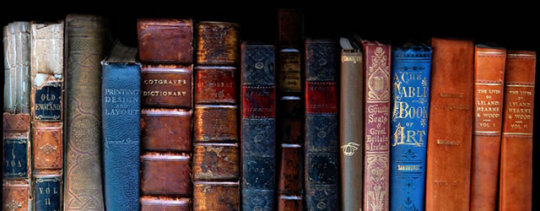
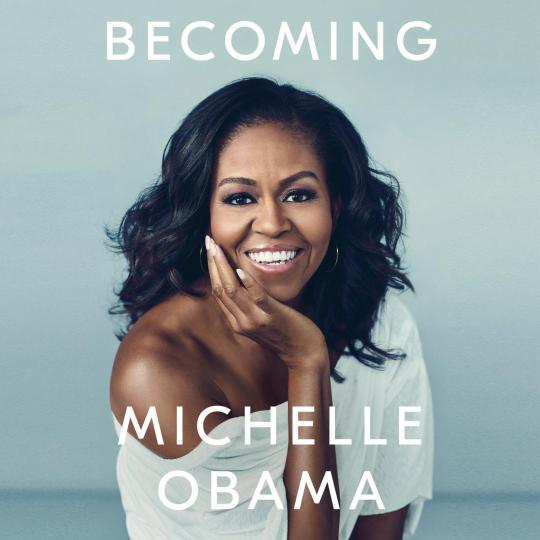
Becoming by Michelle Obama | Memoir
This memoir follows Michelle from childhood until 2018. Her voice, her sweet family members, and the tidbits of secrets of what happened behind the White House's closed doors were the highlights of the book. Also, her strength, while the media tried to tear her to pieces for being a strong black woman in power, was really amazing to read. So many parts of the book must have hurt to write and relive, but I'm so glad I was able to glimpse all of these moments
"It was one thing to get yourself out of a stuck place, I realized. It was another thing entirely to try and get the place itself unstuck."
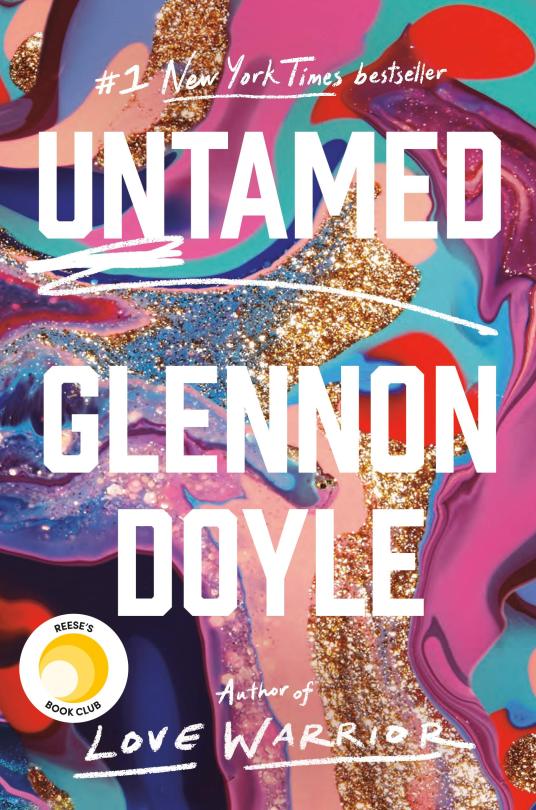
Untamed by Glennon Doyle | Memoir, Self-Help
I've never read Doyle's earlier works, but they were apparently about how to strengthen your marriage. And then before this book, she came out as a lesbian and divorced her husband -- talk about a career move. This book really feels like a homage to stop giving fucks for anyone other than yourself and those you love. It made me laugh and think about my life, and also cheer whenever she talked about her current partner. Definitely recommend to lesbians or those who want to learn how to put themselves before anything else. (Or anyone with religious trauma).
"And my way of life is to dare to imagine the truest, most beautiful life, family, and world—and to then conjure up the courage to make real what I have imagined."
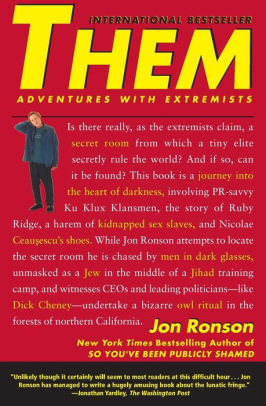
Them: Adventures With Extremists by Jon Ronson | Non-Fiction
Jon Ronson, a Jewish journalist, hangs out and observes different extremists from different cultures and countries in a pre-9/11 world, and interviews their "enemies". This book might not be for everyone, but I think everyone should try to read it. Before social media, there were already bubbles of different groups getting terrified of "them" and dehumanizing the other until they are the boogeyman. The reason I read this book was that my parents are extremists (who would make some people in this book cringe) and I just wished I could know why they see the world that way. It's kind of funny that Leftist and Alt-Right people both believe the government don't care about us and that corporations are controlling things in a scary way. The only difference is the foundation of the Alt-Right argument is based on racism and intolerance. It makes you think.
“Young people are seeing this big task before them,” explained Ali, “trying to combat economic global corporatization. And a lot of them have read David Icke and thought, ‘Hey! He’s on our side. I’m looking for answers and he seems to have them.’ And we’ve made them feel stupid, like they’ve done something bad by getting sucked in.” Ali paused. “And now they’re saying to us, ‘Don’t tell me I’m stupid!’ What we should have said to them was, ‘You’re not stupid. We understand why you thought he was OK.’ But we didn’t. And now they think we think they’re stupid.”

Sister Outsider by Audre Lorde | Essays, Speeches
This is a collection of essays and speeches by Audre Lorde ranging from topics of black feminism, black power, lesbian life, eroticism in real life, and more. It was incredible to read speeches in which she called out people there on their biases and bigotry. This collection should (and in some parts is) be considered a classic.
"That we not hide behind the mockeries of separations that have been imposed upon us and which so often we accept as our own. For instance, “I can’t possibly teach Black women’s writing — their experience is so different from mine.” Yet how many years have you spent teaching Plato and Shakespeare and Proust? Or another, “She’s a white woman and what could she possibly have to say to me?” Or, “She’s a lesbian, what would my husband say, or my chairman?” Or again, “This woman writes of her sons and I have no children.” And all the other endless ways in which we rob ourselves of ourselves and each other."
#audre lorde#michelle obama#jon ronson#glennon doyle#untamed#sister outsider#becoming#them#top books of 2022#book recs#nonfiction book recs#non fiction book rec#nonfiction book rec#nonfiction
2 notes
·
View notes
Note
Was Mr. Oz a Bad Idea? Does a living Jor-El in the "modern day" of the DCU have any potential?
Yes he sucked.

He's an example of yet another loose plot thread that Johns pawned off on other writers to finish. While it didn't help that Oz's "true identity" was clearly something that changed over the course of his existence - in his debut he seemed to be Pa Kent, his early Rebirth appearances teased Ozymandis with the way his screens formed a nine panel grid - Jurgens still handled him about as boringly as one could, making him generically evil via mind control, so he doesn't even present a legitimate ideological challenge to Clark. He's just an evil doer who wants Clark to stop being Superman because humans suck and plans on forcing the issue. Note that this doesn't line up at all with Oz being proud of Clark protecting humans initially, but again this is clearly a character whose background went through many revamps.
People can scream as much as they want, and while the execution wasn't perfect, Bendis by far had the best take on him.
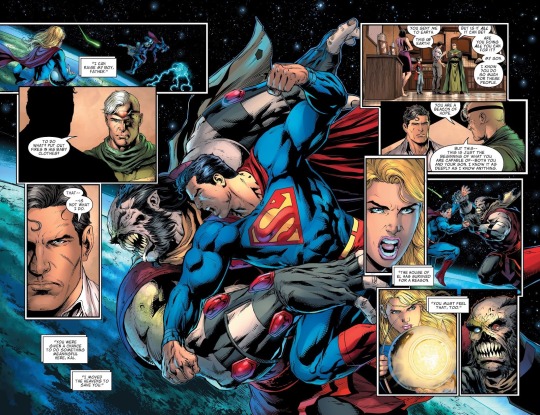
Jor as the "Old World" father who kvetches about how Kal is raising Jon, and complains that Kal isn't living up to his expectations of him? Absolutely rules, benefit of having a Jewish writer tackle Superman again is that Bendis manages to inject more of that culture into the main character once more. Unlike the Kents who are just there to be "wholesome" or to provide basic advice, Jor under Bendis at least served as both a challenge to Superman's ideals, and a story engine given how Kal is forced to deal with multiple screw ups Jor creates on account of his trip with Jon.
Could the execution have been better? Undoubtedly. Ideally we would have gotten Jor showing up and integrating himself into the Kents good graces before he's able to convince them to let him take Jon. Getting to spend more time with Jor trying to mold Jon into what he thinks a proper son of El should be, with Lois being a counterbalance who still differs from her husband in her own right, and Jon having to juggle the different lessons his father, grandfather, and mother are trying to teach him is something I thought would happen and was excited for. Really wanted to see Lois and Jon together without Clark in the picture, there was a great opportunity to let Lois offer her own moral lessons to Jon to balance out all the time we spent seeing Clark teach Jon in Rebirth. And it would have been interesting to see a confrontation between Jor and the Kents, a fight between his surviving Kryptonian parent and his adopted Earth parents over how Kal turned out would have been interesting and entertaining to read. Jor clearly wasn't impressed with "Superman" and to see him critique his son to the people that set him on the path to becoming that strikes me as a chance to talk about the other directions Clark could have taken to become a different breed of hero.
Flawed as the execution was however, it was still a better effort to do something interesting with Jor than what Bendis' predecessors did.
13 notes
·
View notes
Text
16
Brie and Mike went up to take a nap after saying goodbye to their parents. They were both very tired, so a nap sounded like a good idea. Back at the hotel, Bruce and Patti talked about how well the afternoon had gone. She congratulated him for owning up to his mistake of judging Mike. He could be very stubborn and he needed someone to kick him back in line. That’s why he had a wife and two daughters. It was almost four in the afternoon, so they decided to go out to dinner.
After waking up a couple of hours later, Mike received a text from his father asking about Bruce’s apology. Since she was still asleep, he went downstairs to call him. He told him that he had been uncomfortable about their age difference, so he encouraged them to break up. It had nothing to do with his race. No, he never suspected him of being racist. He breathed a sigh of relief.
He understood where he was coming from. They were always aware that not everyone was accepting of minorities. Mike was half-Japanese and he was proud of his culture. He and his family did have their occasional racist comments or jokes. But no, Bruce was not a racist. Baxter yawned after waking up. He went over to find the humans. When he found one of them, he jumped on his leg. Hi, human! He put his phone away before bending down to pet him.
Did he want to go outside? Yes, human! Yes! He laughed before getting up and going to find his leash. It was right by the door with his poop bags. Once it was on and the door was open, Baxter just about bolted from the house. Oh my god! He told him to stop. Stay! He stopped to let the human catch up. Come on, human! There were birds and squirrels to bark at, as well as new smells to sniff.
They found a steady pace. He stopped occasionally to smell new scents. After using the bathroom, it was cleaned up. Good boy! He smiled happily. Yes, I am a good boy! He had a great nap. Now his little legs wanted to move around. His paws felt great on the pavement. He didn’t have to wear shoes as the human did. Humans were weird. He couldn’t figure them out. They were different from him. Instead of walking on four legs, they walked on two.
But they gave him love, food, and pets. So, he was keeping them around. When they got home, Brie was in the kitchen eating leftovers from the night before. They said hello to each other, while Baxter went to his food bowl.
“Thanks for taking him for a walk.”
“You’re welcome. How did you sleep?”
“Like a baby. How about you?”
“I slept wonderfully! I keep thinking about getting a dog. I know you were thinking about adopting another one.”
Yeah, she was. What kind of breed was he looking to get? He had done the research and he was interested in getting a French bulldog. Since they were talking about moving in together, he just wanted to ask her first. Oh, yeah. She told him to go for it. He thanked her with a kiss on her cheek. She could teach it, French. He laughed. Jon texted her while he and Baxter were out asking if he could come over for a while.
Was he up for that or should they wait until tomorrow? He thought about it before deciding he could come over. She went over to her phone and called him. He was on his way. When he got to the house, he hugged her before introducing himself to Mike. It’s nice to meet you. Baxter, who had run to the door followed behind them. He was curious about the new human. There were a lot of new humans he was meeting! He wanted to say hello to all of them!
Jon heard from his wife about their engagement. Congratulations! They thanked him. They had their parents over earlier. Did he want anything? He asked for a beer, so she excused herself to get one for them from the refrigerator. Jon then asked him how he met Brie. It was at a Hollywood party. He had gone for networking and was kind of bored. Until he met Brie.
They dated for a while before deciding not to continue their relationship. It took about a year before he finally slapped some sense into him. He knew that if he didn’t ask her to marry him, someone else would. How did he ask her? She came back in time to answer that question. After handing both of them a bottle of beer, she sat down. She then told the story of how they were laying on her bed when she told her how he didn’t want to just be her best friend anymore.
“He also said he didn’t want to be the guy I went to when I was hurt by other guys. Then he asked me to marry him.”
“That is adorable!”
They laughed. What did she say? Fuck yeah! They laughed again. She was never the one to mince words. They all learned that when she was a toddler. Sometimes they wouldn’t know exactly what she said because it would be in French. He heard about that. She would get frustrated when they couldn’t understand her. It would usually be something small like her dolls not listening to her. She was also the child who wasn’t scared of anything.
She would chase bugs around outside or climb onto horses like she had been riding them her whole life, even at five years old. When his son, Jesse was born in 1995, she would boss him around. Did he have any other children? He had a daughter, Stephanie, Jesse, Jake, and Romeo. She and Stephanie were a year apart, so they used to play together.
Whatever happened with her inheritance? Bruce negotiated with her parents to give her five hundred million dollars. He was shocked and his jaw fell open.
“You’re kidding! What are you going to do with that money?”
“Go to Vegas. Hire some strippers and escorts. Develop a thousand-dollar-a-day drug habit. I haven’t decided yet.”
They laughed.
“I’m just kidding. I don’t know yet.”
Bruce was the go-between between her and her parents because he didn’t want them to contact her. Growl. They looked over at Baxter, who was chewing on a stuffed rabbit toy. He used his teeth to strangle it while he held it with his paws.
Jon had some insight into her parents. He and his wife agreed they didn’t do a great job in raising her because they didn’t put her first. They had many conversations about that with them. It was different for her because she saw it from the perspective of a child. She agreed with that. What they saw were permissive parents.
They tried their best for her. In giving her whatever she wanted and not being there, they didn’t realize how badly they screwed up. She had every right to feel resentment but he didn’t agree with cutting them out of her life. He suggested talking to them and hearing what they had to say. Then, she could decide whether or not to cut them off. Could she do that? Yeah, if he or Bruce went with her. He would talk to him about that. Thank you.
@zoeykaytesmom @feelingsofaithless @alina-dixon @fiickle-nia @boricuacherry-blog
1 note
·
View note
Text
FIRST BLOG POST!! Art (30)
Hello! My name is Jon Cannon, or sometimes I go by Kae in online spaces! My major is Fine Art with an emphasis in Drawing and painting, along with a single subject teaching credential in art teaching. I am very close to achieving both of these goals and mainly need this course for art teaching, and should complete my coursework by early 2024 so I am very excited about that. My main goal is to become an art teacher and hopefully later on work in the creative entertainment media field with a massively popular company like Riot or Disney or Blizzard.
Art has always been at the forefront of my interests, but I also have developed a few other interests over time. These include swimming, being a big movie/TV show lover, gamer, foodie, music enjoyer, and esports watcher too! Some of my favorite pop culture properties that have influence my life and my artwork include Avatar the Last Airbender, Star Wars, The Legend of Zelda, Mario, Lord of the Rings, Pokemon, and most other Nerdy type of media. I’m always down to catch a movie or eat food with friends or hang out and game with them as well.
Hopefully with the use of Photography I can expand my artistic tastes, voice, and media capabilities. My dad used to be heavily invested in Filmography and used to use cameras and lighting quite frequently around me, and perhaps some of that seeped into my interest in taking a photography class. Overall I hope to learn awesome skills to improve my artwork!
Self Portrait:

1 note
·
View note
Text
Cancel Culture vs. Accountability Culture
Cancel Culture is a huge part of our world today, any one who has one of the major forms of social media has either seen cancel culture first handedly or even joined in on cancel culture. People love to cancel other people for something that they either did or said in the past. People definitely need to be held accountable for their actions and deal with consequences but we all need to make mistakes and if we are able to grow from those mistakes and be accountable for them isn’t that what being a human being is. Accountability culture is when someone makes a mistake and you hold them accountable to that mistake. However, you do not just write this person off and hate on them until there is no more of this person. Accountability culture will make sure that this person owns up to their mistake and is accountable for it by apologizing and taking action towards fixing their mistake.

I am a big football fan and love the Chicago Bears. Jon Gruden who was the old head coach of the Oakland Raiders in the NFL was canceled this past football season. There were emails that Jon Gruden sent over the years that were leaked. These leaked emails had proof of Jon Guden saying racist comments about a worker for the NFL commissioner. Jon Gruden was immediately fired and hated on with no response from him and poof he was gone just like that. These actions can not go unnoticed as they need to be reprimanded however if Jon Gruden was able to own up to those mistakes and face it like the bigger person, showing that he made mistakes in the past years but has grown as a person since then why could we not of held Jon Gruden accountable, had him deal with the consequences but move on as a human being with some form of a second chance. One of the more recent examples of cancel culture that has occurred was this past summer when Morgan Wallen said the N-word on a night out. Everyone canceled him, he was being called a horrible person, his music was taken off of all billboards, he lost deals, tour deals, and much more. People were not able to completely cancel Morgan Wallen as people kept listening to his music and kept him at the top of the music charts. Lil Durk, a top of the charts rapper, sat down with Morgan Wallen and they had a very productive yet deep and critical thinking conversation where they were able to explain and grow as people. Lil Durk went on to explain the severity of this to Morgan Wallen and told fans that Morgan Wallen was not racist at all and just made a bad mistake. They both went on to later make a top of the charts song called ‘Broadway Girls’. In this case it showed how canceling culture can be counterproductive and accountability culture can be productive if the person is willing to make actual change. Jon Gruden was canceled and never given a chance to grow as a person for all we know he may be even worse and more bitter now because he was canceled. Plus once this wave of canceling is gone people do not even care about it anymore which creates no positive change at all. On the other hand, Lil Durk was able to show an example of accountability culture with Morgan Wallen saying the N-word this was much more productive. It brought plenty of awareness to the situation but let Morgan Wallen learn more, teach others lessons so this hopefully does not happen, and both to grow as a person creating a genuine friendship out of the once large problem. To me, canceling culture is not good as a whole and accountability culture can create positive change and what we need more of in our day to day lives is people willing to make positive changes for themselves and others no matter how big or small the change is. Making the world a better place for us all to live !

0 notes
Text
Writing a Muslim Character
The Mods of the Magnus Writers discord server and community are putting together a variety of resources for Magnus Archives fan creators; these have been collated from articles on the topics, our own experiences, and the experiences of the members of the Magnus Writers discord. These are definitely not comprehensive or the only viewpoints out there, and are by no means meant as a way to police fanworks, but as a way to support and inspire fan creators in creating thoughtful and diverse works. Please note that external links will be added in a reblog to outsmart tumblr’s terrible tagging system, so make sure to check those out as well!
This resource in particular was put together by Mod Jasmine: hi, all!
While there are no canonically Muslim characters in TMA, Muslim headcanons are common in fanworks—particularly for Basira, and sometimes Jon (which I love to see!). I have cobbled together this post from my own experiences to help support and inform fans in these areas, and as part of my diabolical plan to get more Muslim!Basira and Muslim!Jon fics to shove into my brain.
First, two gigantic caveats:
I was raised Sunni Muslim in Egypt, which is a majority Sunni Muslim country, and still live there. This means my experience will be very different from someone raised in a majority Christian country like the UK, and different again if they are not Sunni and not Arab.
I am currently ex-Muslim. This does not mean I bear any ill will towards Islam or Muslims, just that it wasn’t for me, and I felt it was important to be upfront about that. I’ll be linking to resources by practicing Muslims in the reblog to this post, whether to add to my opinions and experiences or provide you with a different opinion. I am not here to put my voice over that of Muslims, just to do some of the work so they don’t have to. Obviously, if any Muslims have any additions or suggestions for this post, I’m happy to accommodate them.
Alright. Now that that’s out of the way, let’s get started with the basics of writing a Muslim character.
(Warning: this is absurdly, absurdly long)
Basics:
Muslims follow two main sources of religious instruction: Quran and Hadith.
The Quran is the holy book, considered to be dictated by the angel Gabriel to the Prophet Mohammed, who then relayed what he was told to his followers. It is composed of surahs, or chapters, which have individual ayat, or verses. There are no varying versions of the Quran, later additions, or anything considered lost in translation. Any Arabic Quran is considered to be the same text that the Prophet Mohammed relayed, unchanged. As a result, while Muslims can debate interpretations of the Quran (although that’s often still left to the scholars), none debate the actual words of the text.
Hadith, meanwhile, are the sayings or teachings of the Prophet Mohammed. Their validity can be disputed, as they were written by his followers after his death, and mainly depend on having several witnesses for a specific saying or situation. The more witnesses there were, the more valid the hadith is considered to be.
When in doubt or should there be any contradiction between the Quran and Hadith, Muslims will always refer to the Quran first and foremost.
Denominations:
The bigggest (but not only!) divisions of Islam are Sunni and Shia, and both of those have separate madhabs, which are the separate thoughts and stances of specific Imams. When writing a Muslim character, a good first step would be to decide where your character’s family might have come from, as that could help inform which denomination your character might belong to. This will in turn inform things like the beliefs they grew up with, how they pray, their holy holidays, and so on. Obviously, all denominations fall under the bigger umbrella of Muslim, but can vary in practice.
Background:
The intersection of culture and religion affects a character beyond which denomination they likely belong to, such as whether they call prayer salah or namaz, the foods they might associate with Ramadan or Eid, and their community’s stance on things like hijab and alcohol.
One thing to keep in mind is that being Muslim is not synonymous with being Arab and vice versa. Not all Arabs are Muslim, not all Muslims are Arab or even Middle Eastern. In fact, the largest Muslim country in the world is Indonesia. That said, depending on your character’s race and backround, there is the potential they may have faced Arab elitism or other strands of racism within Muslim circles. Please see the reblog of this post for an article about one Black British Muslim woman’s experience with racism.
And, of course, your character and their family do not need to have been immigrants at all. They or their family may have been converts instead. According to most Muslim schools of thought, all that’s required for a person to be Muslim is stating the shahada in Arabic, honestly and with intent. It goes, “Ashhadu an la ilah illa Allah, wa an Mohammadan rasul Allah,” which translates as “I bear witness that there is no god but God, and that Mohammed is His prophet.” Shia Muslims, I believe, have an additional section, but otherwise that’s it. Recite that in front of witnesses with sincere belief and that’s all you need to be Muslim.
Pillars of Islam:
These are the duties or cornerstones of a Muslim’s faith and considered to be acts every Muslim should strive for. What the pillars are can, I think, differ between denominations, with Shia Muslims having additional ancillaries as well (any Shia readers, please feel free to correct me!) but both denominations agree that the following are important:
Salah—prayer
Sawm—fasting during Ramadan
Zakat—giving a certain percentage of income to charity or the community
Hajj—pilgrimage to Mecca
In all cases, these are considered mandatory only for those who are able. A person who cannot perform hajj, whether due to not being physically able to or lacking the funds to travel, is under no obligation.
Prayer:
Prayer is performed five times a day while facing the Qibla, which is the direction of Mecca. Prayer is formed of units, called rak’at, which consists of a set of actions done in a specific order. The “How to Pray Salah, Step by Step” article linked in the reblog of this post provides fairly good prayer instructions for beginners, so check it out for details! These include bowing, prostrating, and reciting some surahs.
Each of the five daily prayers has a different number of rak’at, as well as its own name and allotted time of day, as follows:
Fajr, which means Dawn and can be performed at any point until the sun rises (two rak’at).
Dhuhr, which means Noon (four rak’at)
Asr, performed in the afternoon (four rak’at)
Maghreb, which means sunset and can be performed at any point until it’s dark (three rak’at)
Isha, performed at night and can be done at any point until dawn (four rak’at)
The specific time of prayer will differ day to day and place to place, according to the sun, but those are the rough timeframes for each. It’s generally preferred that a Muslim does their prayer on time, but in practice some Muslims find it difficult to wake up for Fajr, for instance, and just try to make sure they get a morning prayer in before noon.
On Friday, there is a congregational Friday prayer at Dhuhr in a mosque called the Jumu’a prayer (which, fun fact, literally means gathering and is also the Arabic name for Friday!). Only men are required to take part in the congregation, however.
In Muslim majority countries, the time for prayer is announced by the adhaan, the call to prayer, from mosques and in media. This won’t be the case in the UK, and the character will likely have to rely on an adhaan app or looking up what time prayer should be.
There are various requirements for a prayer to be correct, chief of which is facing the Qibla and purity. Before performing prayer, a Muslim must purify themself by performing wudu, or ablutions, which basically involves washing the hands, arms, nostrils, face, head, and feet a specific number of times using clean water. The way I was taught these must be performed in a certain order, and the person shouldn’t speak during or after until their prayer is finished. This may be different for others.
Wudu is considered valid until nullified by bodily functions such as urinating, defecating, vomiting, flatulence, or any sexual activity. For Sunni Muslims, it’s also invalidated by going to sleep. If none of these have happened, a Muslim can perform more than one prayer using the same wudu.
Notably, a Muslim cannot pray if they’re on their period, as they’re considered in a state of impurity.
Another important requirement is that a Muslim be dressed modestly for prayer. The general guideline is that Muslim men should cover the area between their navel and knees with loose, non-revealing clothing, and that during prayer it’s preferred that they cover their chests as well Muslim women should cover everything except their face, hands, and feet. This means that a woman who isn’t hijabi would still wrap a hijab for prayer. For nonbinary Muslims, I don’t think there are specific guidelines yet, although please feel free to correct me.
If praying at home, a family may choose to pray together. In this case, the male head of the household usually stands at the front and acts as Imam, leading the prayer. Other men will tend to be in front of or beside women, as generally women should not pray in front of a man. This is the case even, especially, if he is not praying.
Children aren’t required to pray, as they’re considered innocent and have no obligations, but may want to take part early on or may be encouraged to practice.
Praying is one area you’ll find denominational differences. For example, while Sunnis fold their arms in prayer, Shia keep their arms to their side, and while Shia Muslims make sure their foreheads touch a piece of clay or earth when they prostrate, Sunnis do not. If you write your character praying, keep these details in mind.
Fasting:
During the holy month of Ramadan, Muslims fast from Fajr (dawn) until Maghreb (sunset) every day. This means they abstain from consuming anything—yes, even water, cigarettes, and medicine. They should also abstain from sexual activities and cursing. Most importantly, they must have the intention to be fasting. This means that not eating and drinking because they were asleep for that entire period of time or just lost track and forgot does not count as fasting.
Generally, the idea is more to try to be more pious and avoid sin throughout the month. It’s thought that the shaytan (or devil) is chained up during Ramadan, so any temptation or sinning is a person’s own doing. The way I was raised, I was taught that sawm/fasting is invalidated by sexual thoughts and raising your voice as well. Many people also try to dress more modestly during Ramadan, with some women opting for looser clothing or a headscarf. Many Muslims will try to read the whole Quran during Ramadan.
After Maghreb, Muslims break their fast with Iftar (which means breakfast, hah) and have a late night meal called Suhour. Since the Muslim calendar is a lunar calendar, Ramadan is 11 days earlier every year. Depending on when Ramadan falls in the year, there can be barely any time between iftar and suhour in certain parts of the world, as the sun is up for so much of the day.
Given the length of time and difficulty involved, there are exceptions and allowances for fasting. A person is not required to fast if they are:
A child (up to puberty)
Ill or has a medical condition such as diabetes
Pregnant
Travelling
On their period
In fact, if they are on their period it will not be counted, even if they do fast. That said, sometimes people choose to fast while travelling anyway, as travel is less strenuous now than it used to be. If they’re crossing time zones they will have to consider which time zone they’re breaking their fast to. As far as I remember, it’s based on the time zone of the place they just left or started their fast in.
If an obstacle to fasting is temporary, such as their period, they’re expected to make those days up with additional fasting before next Ramadan. Otherwise, they are allowed to make up for the lost fast in another way, such as by donating money or feeding fasting people. Whether due to societal pressure (which is formidable in Muslim-majority countries) or out of consideration for others who are fasting, those who are not fasting for whatever reason may often choose to hide this and only eat in secret.
If a person forgets they were fasting or accidentally consumes something, it does not invalidate the fast , and as soon as they remember or realise the mistake they can have the intention to fast again and continue with their day.
While children are exempt, many families will start them off by fasting for half a day so they can build up to a full day when they hit puberty.
Ramadan traditions vary wildly from country to country and culture to culture, but generally it’s a time for family gathering and celebration. Often there are special Ramadan-specific food, drink, and decorations, and it ends with Eid ul-Fitr which has its own specific foods and celebrations. Basically, imagine if Christmas lasted a month. That’s how big a deal Ramadan is.
In my experience, the first few days are usually the hardest. Water is what I tended to miss the most, even if I managed to stay up long enough or set an alarm to wake up to drink just before fajr, followed closely by swearing. Anyone who drinks caffeine or smokes cigarettes will likely find abstaining from those more difficult than water. By the end of the month, though, it gets much easier and I often got to the point where I barely noticed. I will say, however, that the longest I’ve had to fast has been maybe 16 hours. A summer Ramadan in the UK would be more difficult due to the much later sunsets.
Halal and Haram:
Halal means “permissible,” while haram means “forbidden.” You might have heard these words in passing before, such as halal food, but they are used for many areas of life.
Things that are considered haram include:
Consuming, serving, or trading in intoxicants, such as alcohol
Consuming improperly slaughtered meat or meat from forbidden animals, such as pork
Extramarital sex
Tattoos
Gambling
Men wearing silk or gold
A Muslim woman marrying a non-Muslim man (although it’s fine for a Muslim man to marry a non-Muslim woman)
Being immodest
Modesty is expected of all genders, including men. If you’ll recall from the section on prayer, the general guideline for male modesty is that they should cover the area between their navel and knees with loose, non-revealing clothing. Note that for women, modesty does not necessarily involve wearing a hijab. There is actually a ton of controversy as to whether the hijab is a fard (requirement) or not, as described in the following section.
The Hijab:
To be hijabi takes more than just throwing on a headscarf. As a word, hijab means “barrier” or “veil,” and a hijabi person would be expected to cover everything except their face and the palms of their hands, and to ensure that their clothes are loose and non-revealing. It all comes from an interpretation of two verses in the Quran that many scholars nowadays agree to mean the hijab is required, and that some say actually call for a face covering as well, which is called a niqab.
This wasn’t always the case, however, and these days there is still the occasional controversial scholar (I remember a few kerfuffles coming out of Egypt’s Al-Azhar mosque recently) saying it isn’t and has never been required at all. At least in the Arab world, this is largely due to the wave of Wahhabism (which is a specifically fundamentalist interpretation of Islam) that’s taken over the region in the past half a century. Before that, the idea of a hijab being a religious requirement was less widespread.
I’m not here to argue who’s right or wrong, just to make you aware that the hijab as we know it today hasn’t always been considered a requirement for a Muslim woman. Most of the women of my family never wore any form of head covering, but more and more they are an exception rather than the norm.
The choice of whether to wear a hijab can mean very different things, depending on the surrounding culture. For instance, my grandmother, the strictest woman I have ever known, got married in a very cute sleeveless dress that went just under the knees, and when she grew older she wore a head-covering more as a cultural indication of age rather than any religious reason. In my generation, in a country with a Muslim majority, lack of visible signs of devoutness have become almost a class marker, with some upper-class women using their lack of head-covering as a sign that they are “more Westernized” or “modern.” And again, I want to emphasize that this is the case for my country only.
This will be completely different for Muslim minorities, where the hijab can become a symbol of pride and unity.
I will say that it’s very rare for women to be forced into getting veiled, whether in Muslim minority or majority countries. I’m not saying it never happens, just that it’s not the “oppressive tool of the patriarchy” outsiders sometimes think it is. Women may face some societal pressure, but by and large it is considered a choice and often an empowering one. In fact, I have friends whose families discouraged them from wearing a hijab too young and emphasized only taking the decision when they were sure they wanted to. If writing a Muslim character when you’re non-Muslim, I strongly suggest not trying to tackle the story of someone forced into a hijab, as there’s a lot of nuance there and it’s very easy to fall into harmful stereotypes. The hijabi woman who gets “liberated” and takes off her hijab is also overdone and harmful. Please don’t.
Everyday Life:
Muslims are not a monolithic entity, and some will be more devout or religious than others. There are those who will pray their five a day and others who only pray during Ramadan or Eid, some who don’t drink and some who do, hijabis who dress only in loose clothing and those who wear tight trousers or show some of their hair, some who have tattoos, and some who may date or even have sex before marriage. However, this isn’t a carte-blanche not to do research when writing a Muslim character, because even if they break a rule of Islam, they will be conscious of it, may be concerned about their community’s response to it, and in any case will be affected by it.
For instance, I know many Muslims who drink alcohol. Some interpret the text differently, saying that since the sin is getting drunk then they won’t drink enough to get drunk, just buzzed. Some only do it on special occasions or on vacation, saying they know it’s a sin but it’s fine on occasion and they’ll repent later. All of them would probably dive under a table if they thought their family was nearby.
For more opinions on Muslims and dealing with alcohol, take a look at the “Islam and Alcohol” article linked in the reblog of this post.
Here are things that a character who is a practicing Muslim might do or be concerned about in their day to day life:
Checking ingredients to make sure they’re all halal. This goes for things like food, drink, medicine, anything consumable. Things like gelatine capsules are only halal if the source of the gelatine is itself halal, for instance.
Keeping up with their prayers. With five prayers a day, some will inevitably happen while they’re out of the house. Some Muslims prefer to just group their prayers when they get home, but since it’s preferable to do prayers on time, others may try to pray while out and about This means considering the following:
Finding a bathroom for wudu. Part of wudu involves washing feet and the head, which isn’t feasible in a public location or if the person is hijabi and doesn’t want to unwrap and rewrap their hijab. In that case, they can generally wipe a wet hand over their socks and top of their head covering.
They may carry a prayer carpet or have one stashed in a convenient location, but it’s not a must.
Finding a clean and secluded place to pray. Generally, it’s not done to pray in a place where someone will pass in front of you, and a woman must also take care to pray away from men’s eyes.
Figuring out where the Qibla is. Luckily, there are apps for that.
If a woman is not hijabi, she would have to carry a veil and, depending on her clothes, something to cover up so she can pray.
If they’re hijabi, they’ll probably have to adjust or re-wrap their hijab throughout the day, depending on the material and their activities. This would typically happen in bathrooms or any other space that doesn’t include men, as they can’t reveal themselves to any men who aren’t of their immediate family. For more on the hijab, and the day to day realities of wearing and wrapping one, take a look at the links provided in the reblog of this post.
A Muslim woman may choose not to accept handshakes from men who aren’t family. She has probably considered how to deal with that potential awkwardness.
If they’re fasting, they might carry some dates or biscuits or something in case they need to break their fast while on the go.
If making plans, they might say, “Insha’allah” which means “God willing.” I was always admonished to do so to acknowledge the future is entirely within God’s hands.
If asked how they are, they might reply with “Alhamdullilah” which means “Thanks be to God.”
When starting to eat, they may say, “Bismillah,” which means “In the name of God” and when done eating may say “Alhamdullilah.” These can also be invoked silently.
As you might have noticed, Allah’s name is invoked pretty often. While it’s not preferable to swear using God’s name just to make a point (“Wallahi”), there’s nothing against it, really.
Fundamentally, an important thing to remember is that Islam is a religion of ease and not hardship. This is an actual Quranic quote. What this means is, it may seem like there are a lot of rules to keep in mind, but there are also a ton of allowances for when those rules aren’t feasible, just like the case for fasting above. Other allowances include how an elderly or disabled person who may not be able to perform the motions of prayer can pray while sitting in a chair or even lying in bed. If there isn’t any clean water to purify before prayer or if using the water would mean lack of drinking water, a Muslim can use dust or sand to purify, and if no dust or sand is available then they don’t need to purify at all and can simply pray.
This means that, say, if your Muslim Jon wants to pray while kidnapped by the circus, he can, even without being able to perform wudu, even without knowing where the Qibla is, even without being able to move or say anything at all.
For more day-to-day tidbits, check out the “More on writing Muslim characters” link in the reblog of this post.
LGBTQ Muslims:
Needless to say, Queer Muslims absolutely do exist, and their being Muslim doesn’t cancel out their queerness or vice versa. While there are Quranic verses that have been interpreted as condemning homosexuality, there are also other interpretations, and queerness has existed in Muslim societies for ages. There was a ton of homoerotic imagery among Abbasid poets during the Golden Age of Islam, for example.
However, modern-day attitudes can be difficult to get around, and queer Muslims may have difficulty finding their place in both Muslim spaces and queer spaces, the latter which often expect them to reject religiosity.
Although I am queer myself, I don’t feel it’s my place to speak for queer Muslims and their relationships with their communities beyond this, so I’ll let some queer practicing Muslims speak for themselves. Please see the reblog of this post for valuable contributions from queer Muslims about their experiences.
Miscellaneous:
This is mostly for all the random tidbits I thought up while writing this that didn’t fit anywhere else and also because I don’t know when to quit apparently, SO!
Allah is just Arabic for God. Muslims can and do use these terms interchangeably, such as saying “God willing,” instead of “Inshallah,” even in an Arabic-speaking country.
Also, God has 99 names! Just a fun fact for you there.
The Devil in Islam is pretty different from his Christian counterpart. Referred to as Iblis or Shaytan, among other names, he is not a fallen angel and there is no great revolt story, nor is he considered a root of all evil. Instead, he is a djinn made of smokeless flame who refused to bow down to Adam, as he felt he was made of superior stuff and not about to bow to a creature made of mud. His disdain for humanity is what has caused him and other shayateen/demons to try and tempt humans.
A person’s right hand is considered purer than their left, so it’s encouraged to always eat with your right hand. Unfortunately, this does mean left-handed people face something of a stigma—or at least that’s the case here in Egypt. My cousins, both lefties, both eat with their right hand, though they do everything else with their left.
Similarly, it is considered better to enter spaces with your right foot, though only the most devout are likely to think of this all the time. This is especially considered for entering a mosque or new home.
A Muslim might say or write “Peace be Upon Him” whenever the Prophet Mohammed is mentioned, written as (PBUH), and “Subhanuh wa Taala” when mentioning Allah, written as (SWT).
The Evil Eye is mentioned in the Quran as “hasad,” and considered to be a very real thing. This jealous or envious energy is considered able to ruin good things in your life, even if the jealous person didn’t intend to. There are some surahs that are considered good to ward against it, as well as incense, the colour blue, the number five, and the symbols of the nazar (which is a round, blue-ringed eye) and the khamsa (an open five-fingered palm, also known as the Hand of Fatima). The nazar, khamsa, and belief in the evil eye aren’t unique to Islam at all. What is unique to Islam is that a Muslim might preface a compliment with “Masha’allah” which means “As God wills it,” to ward off their own evil eye.
Much of the Quran in Arabic rhymes and is very poetic, which can make surahs easy to memorise by rhythm. It can also make recitations by a skilled reader very lovely.
3K notes
·
View notes